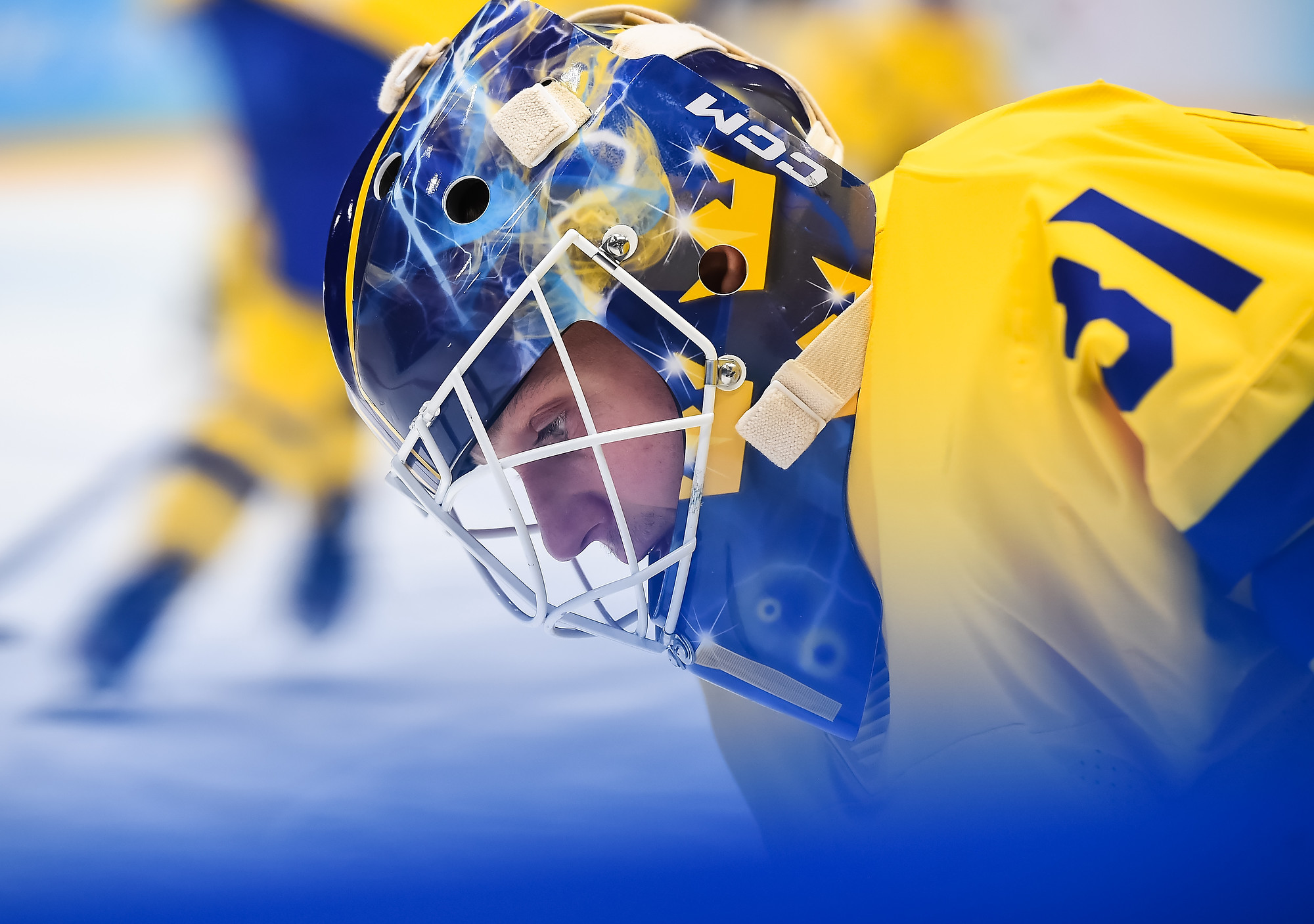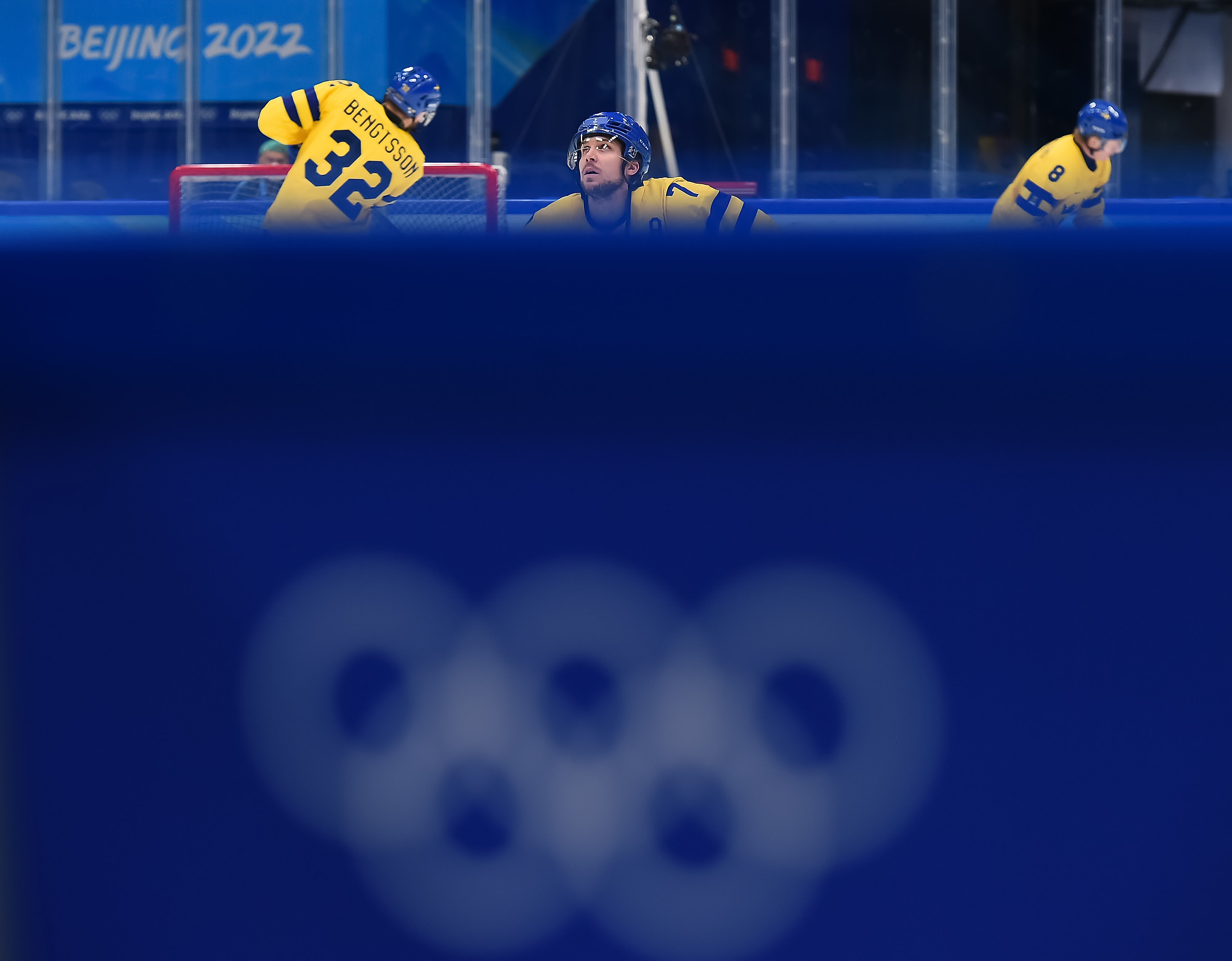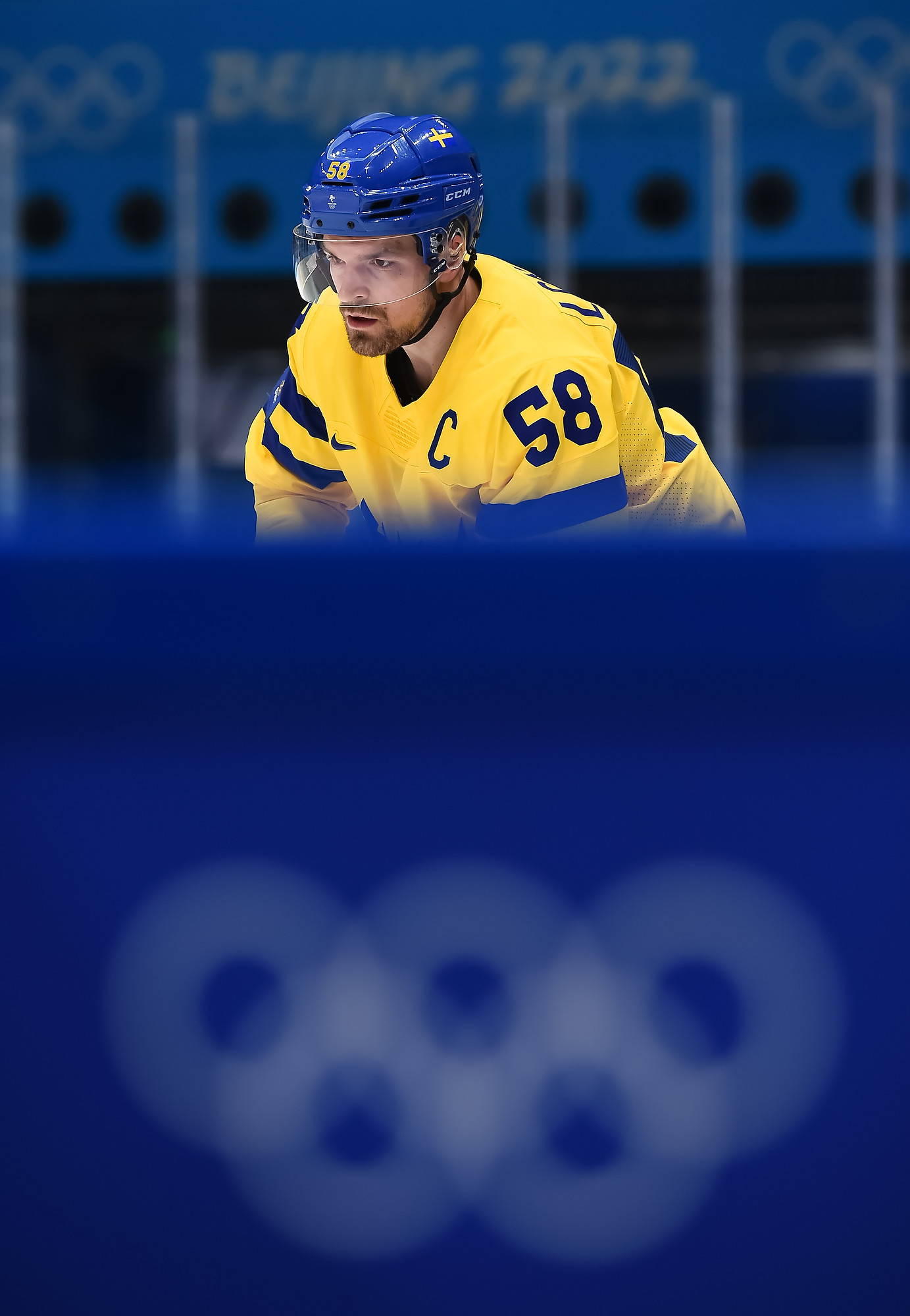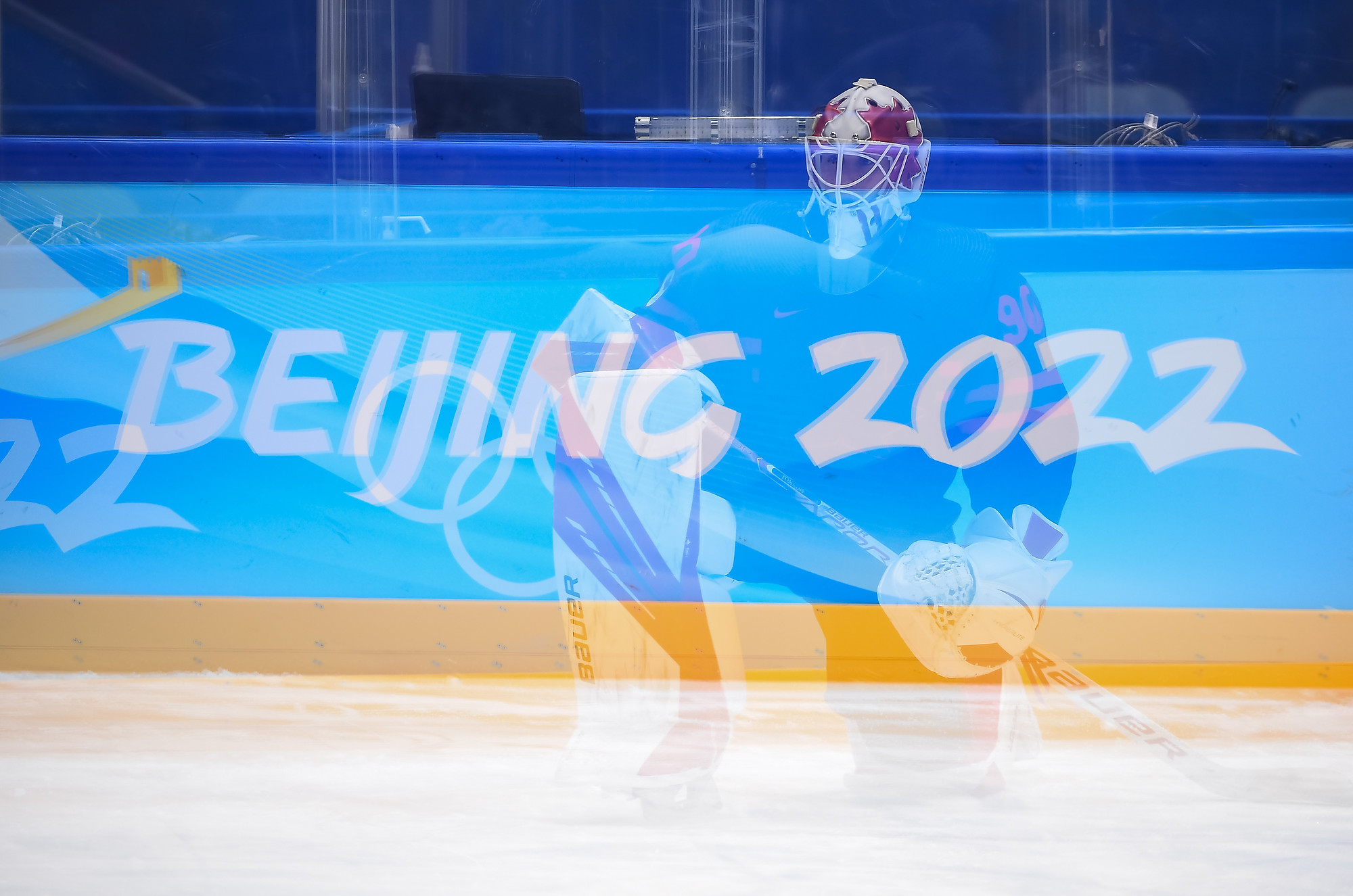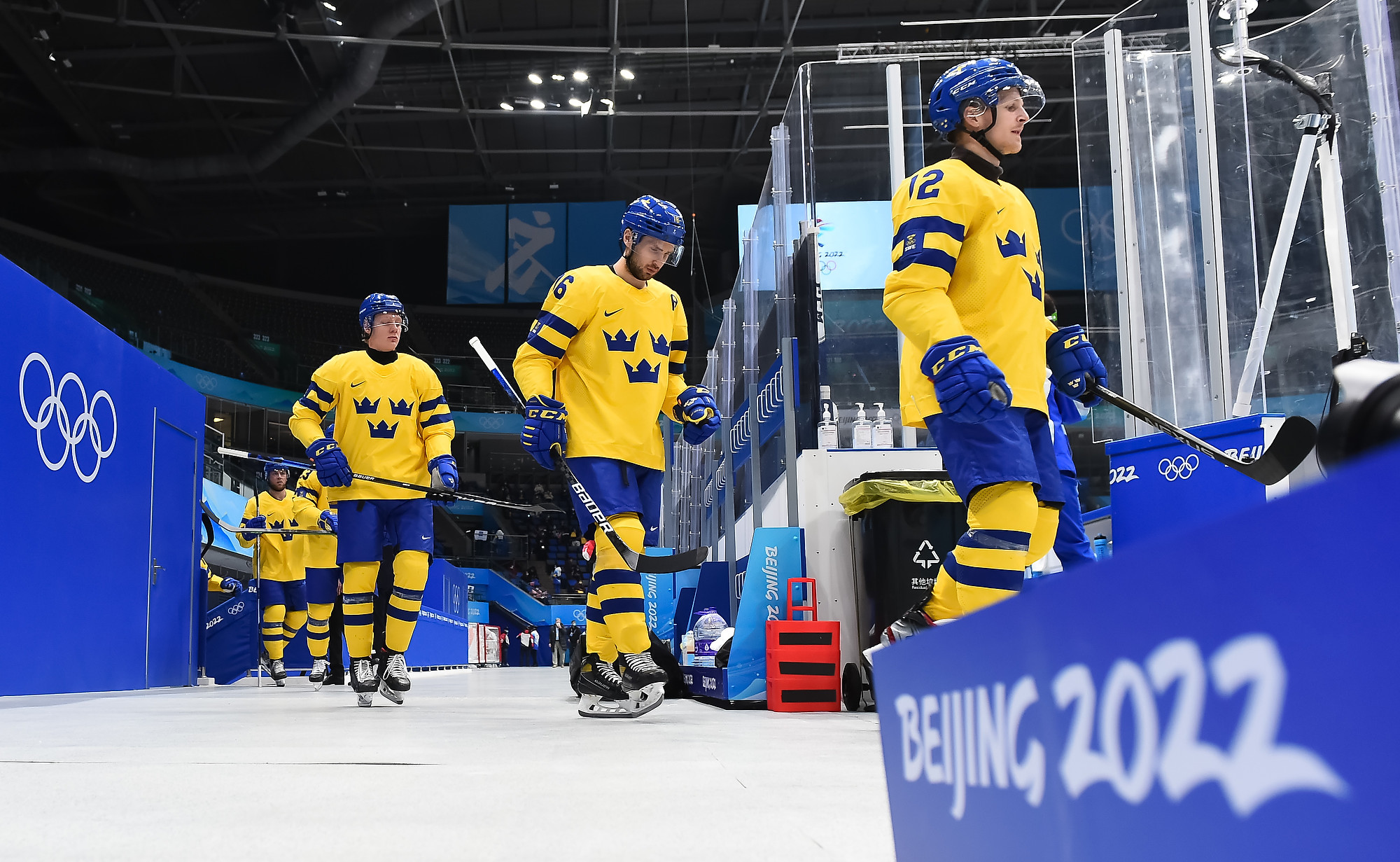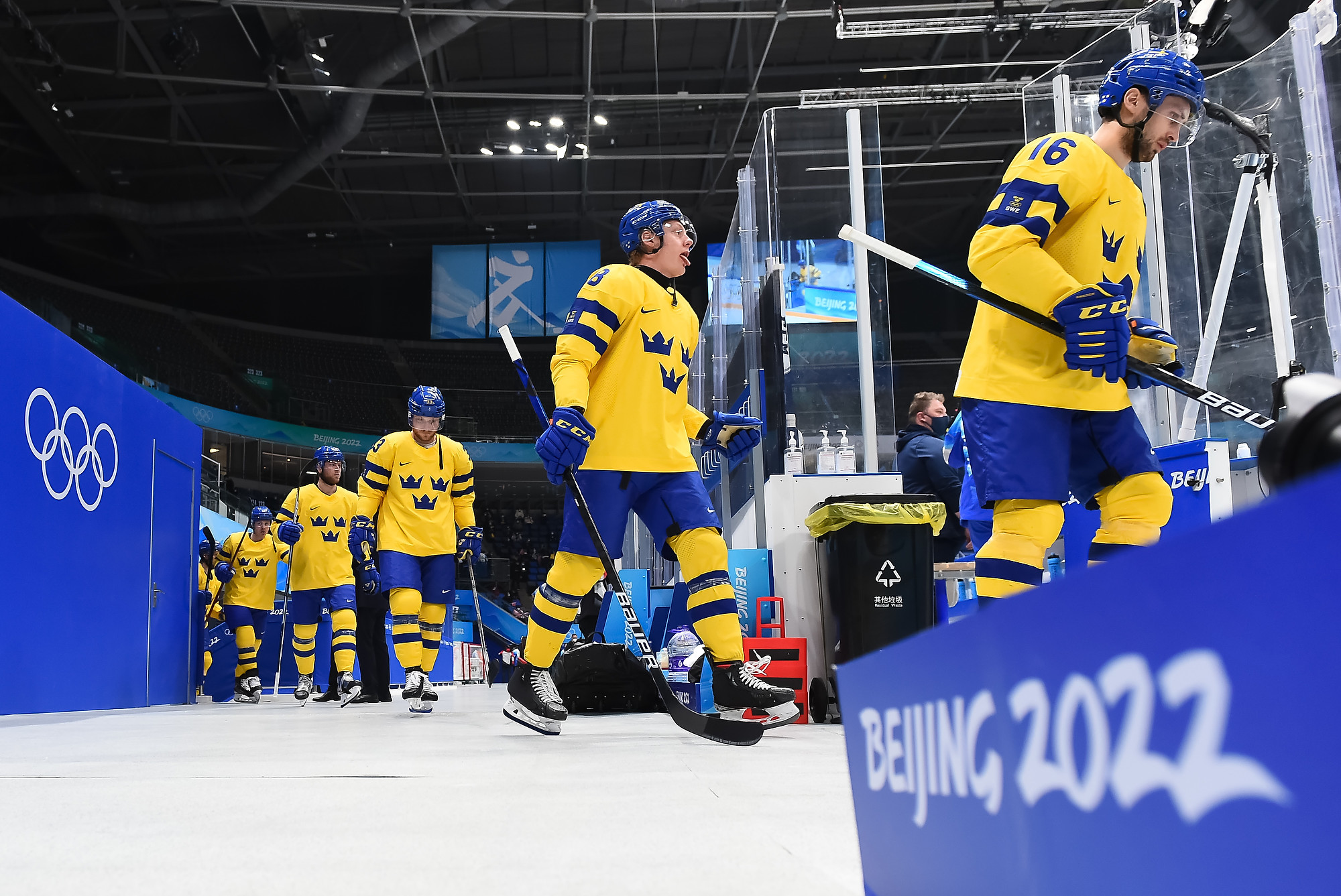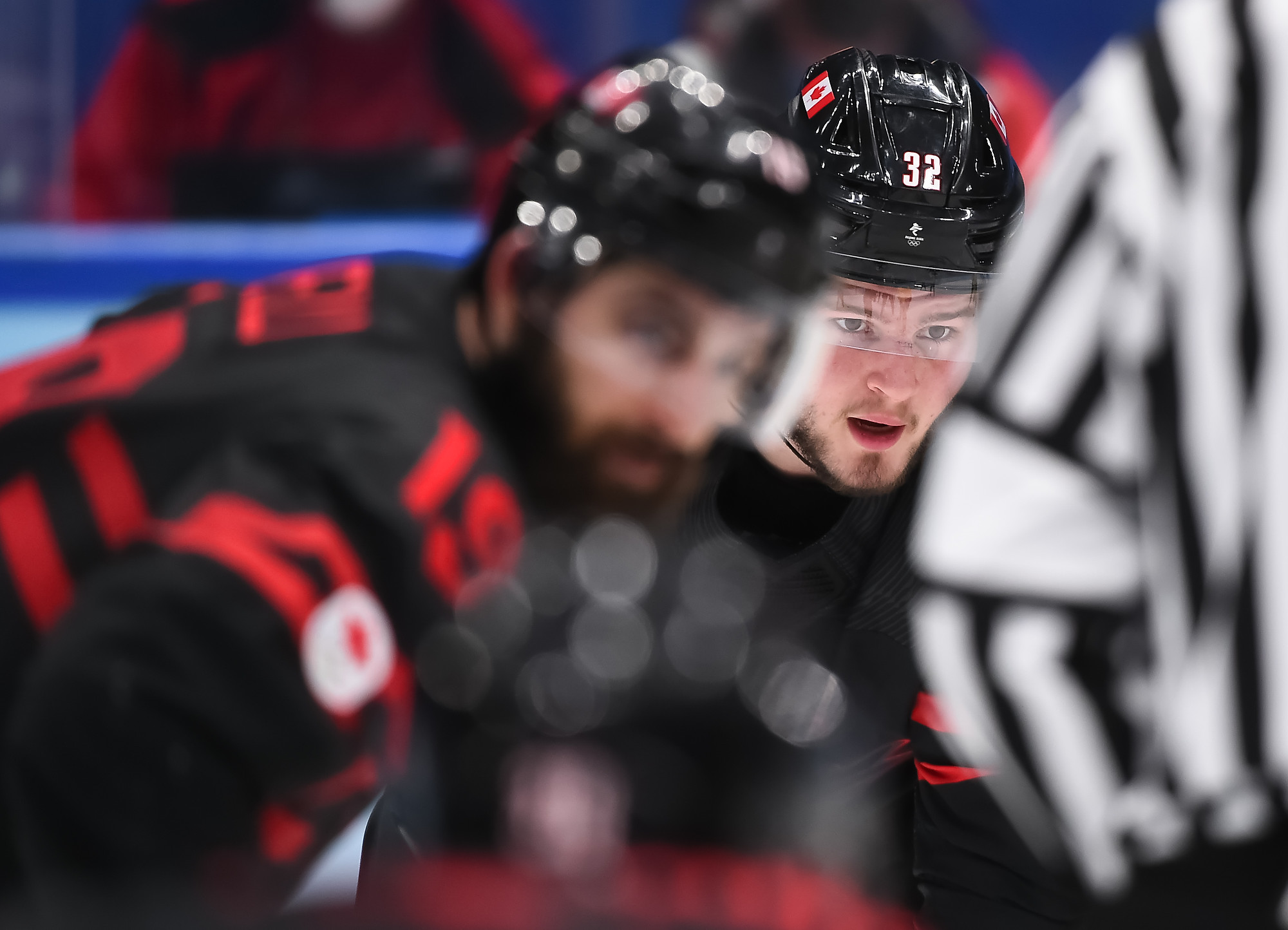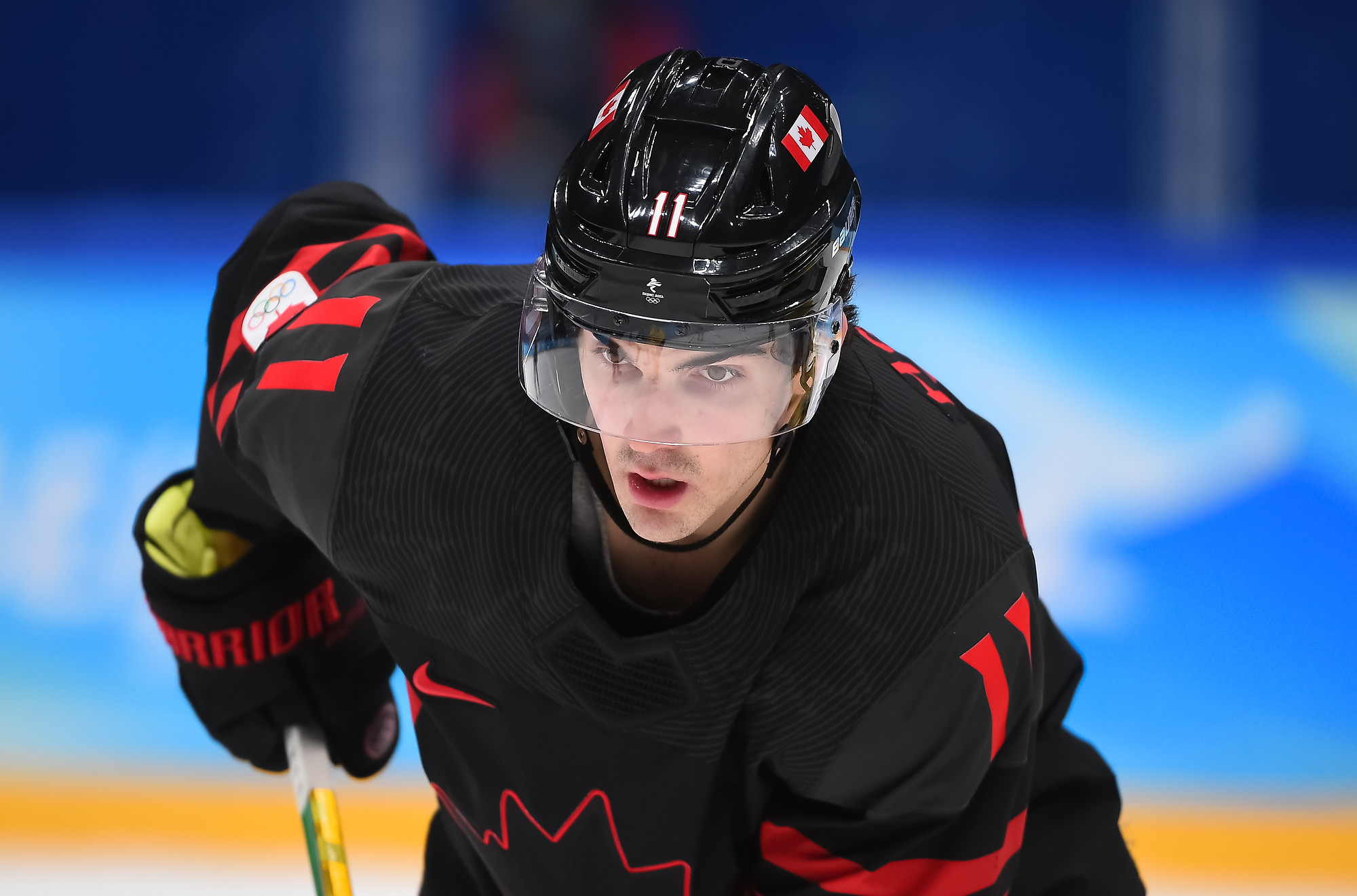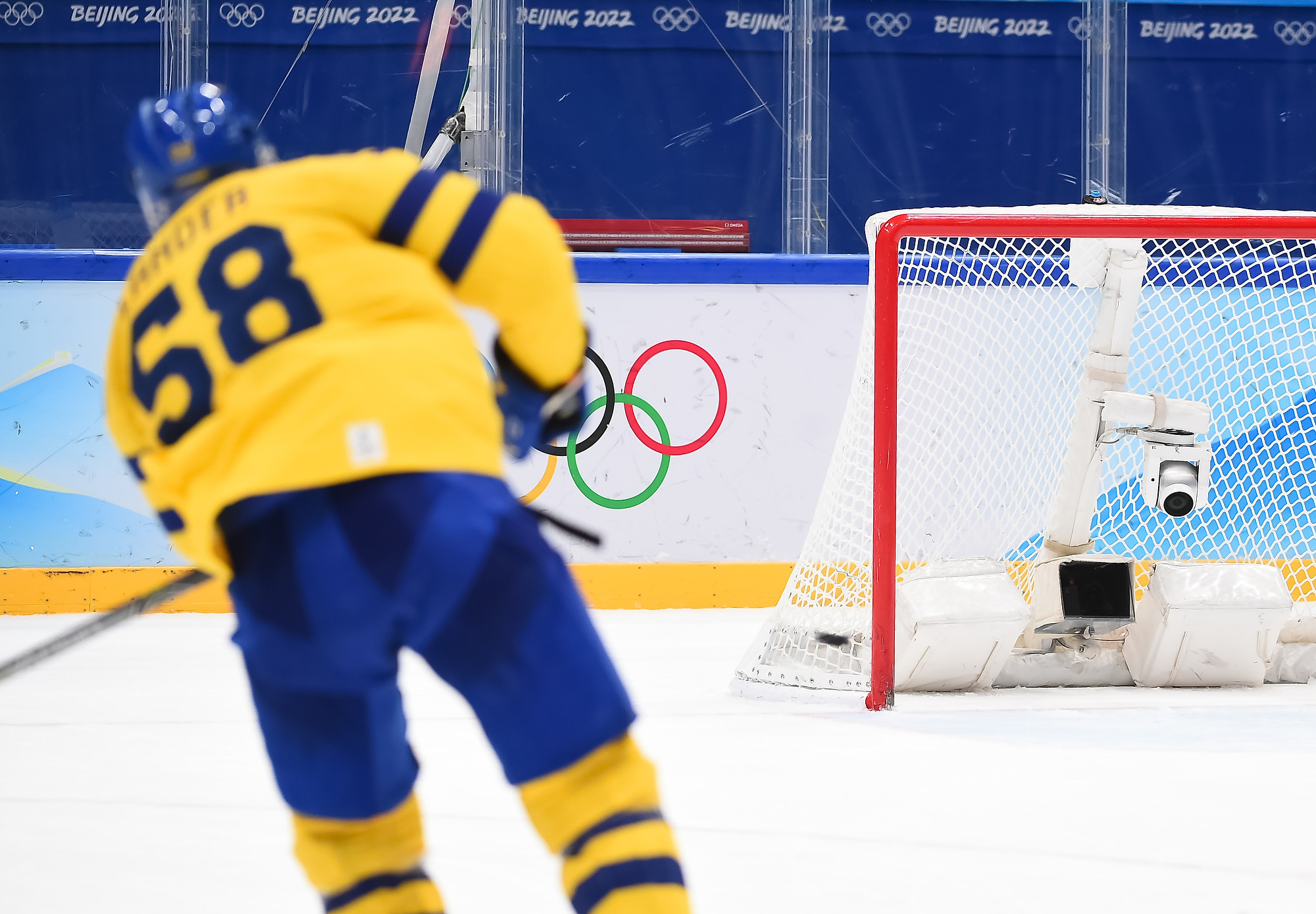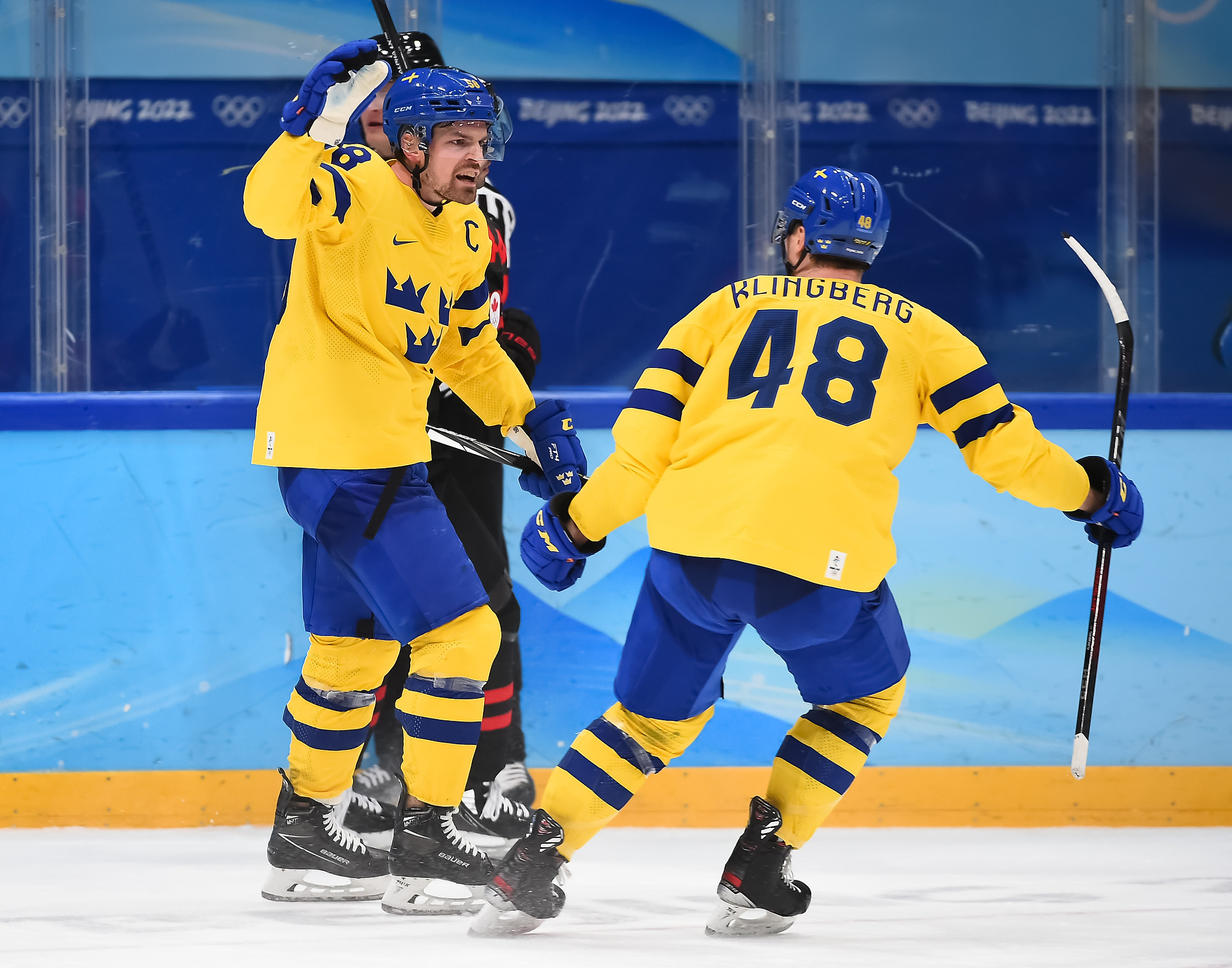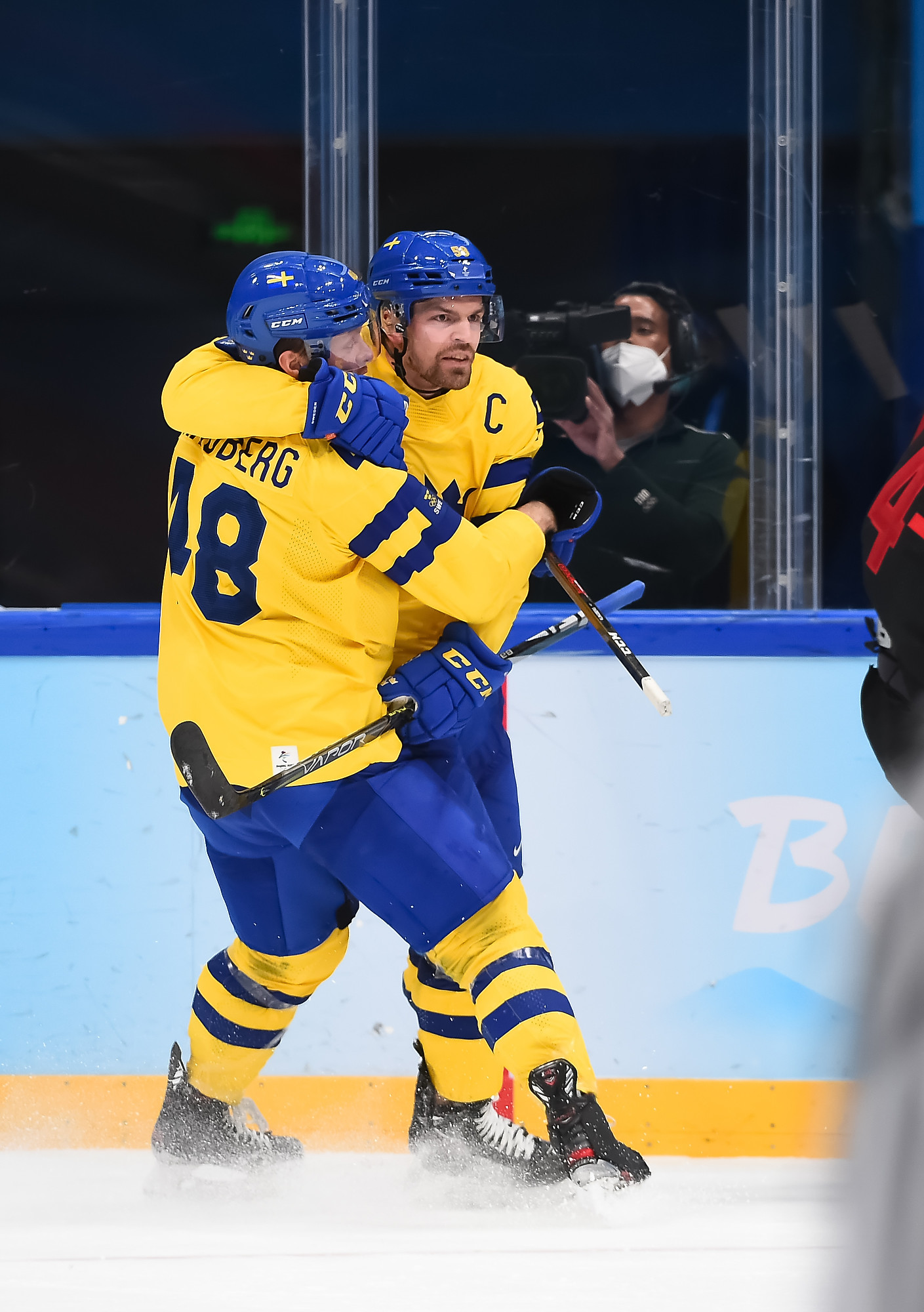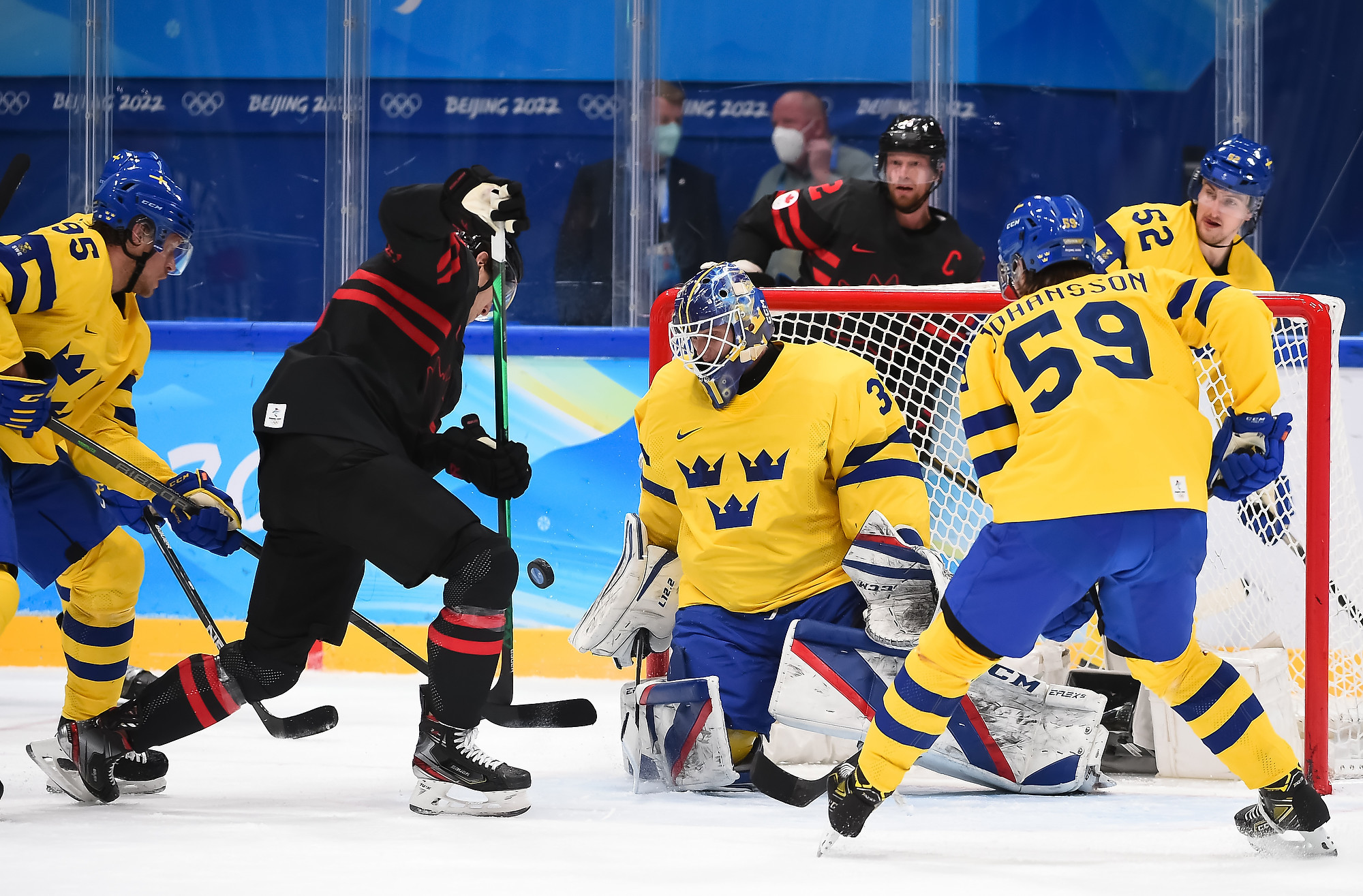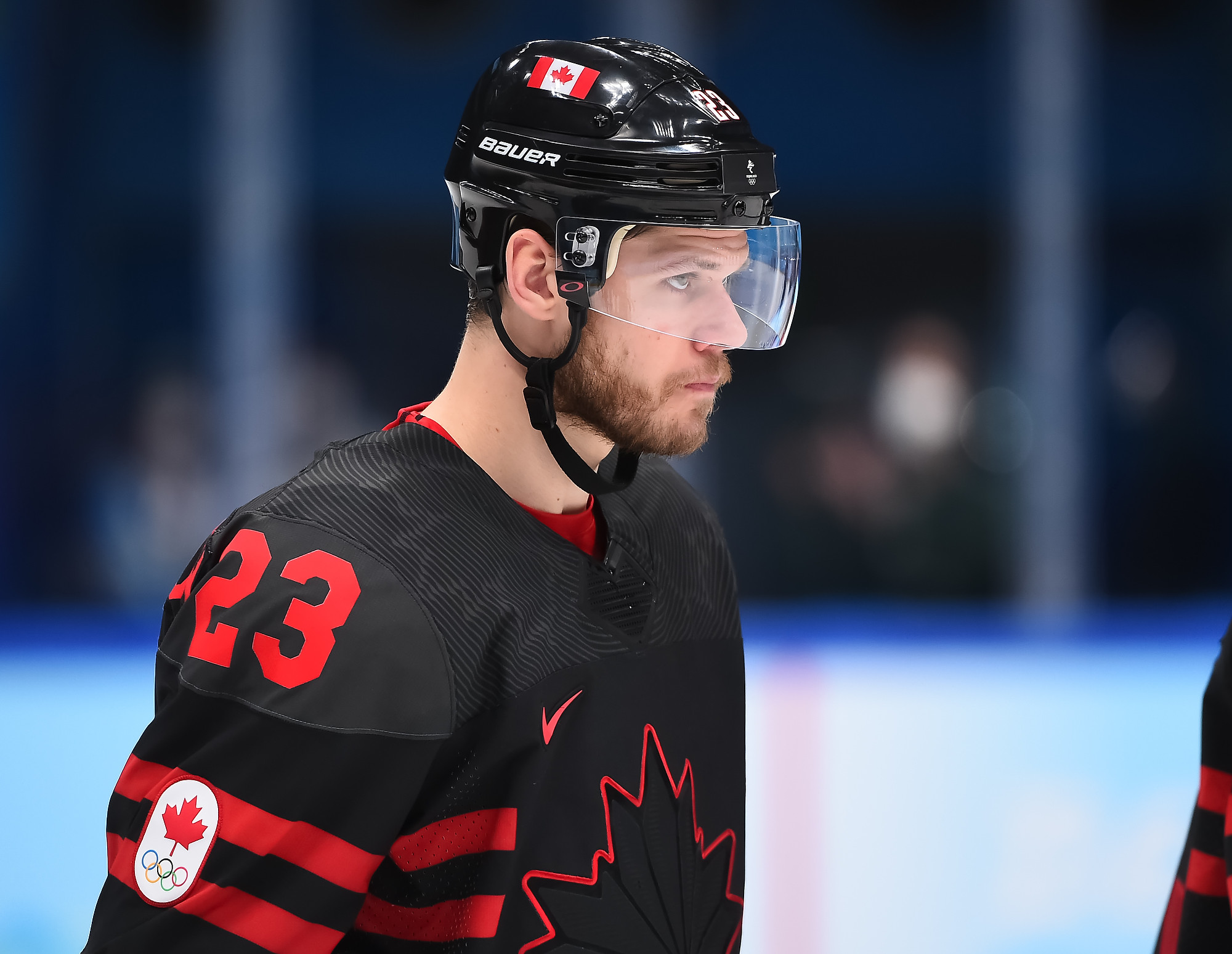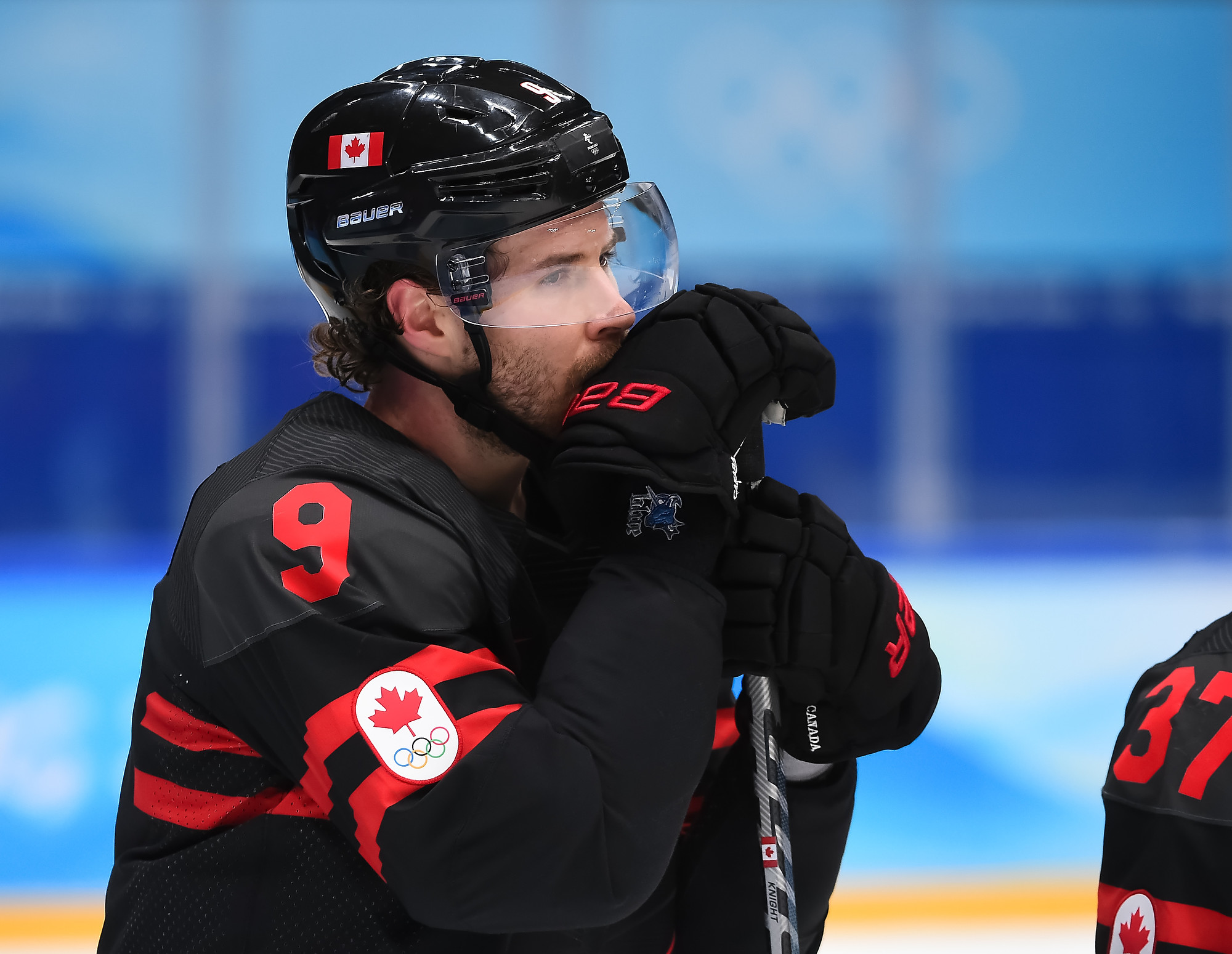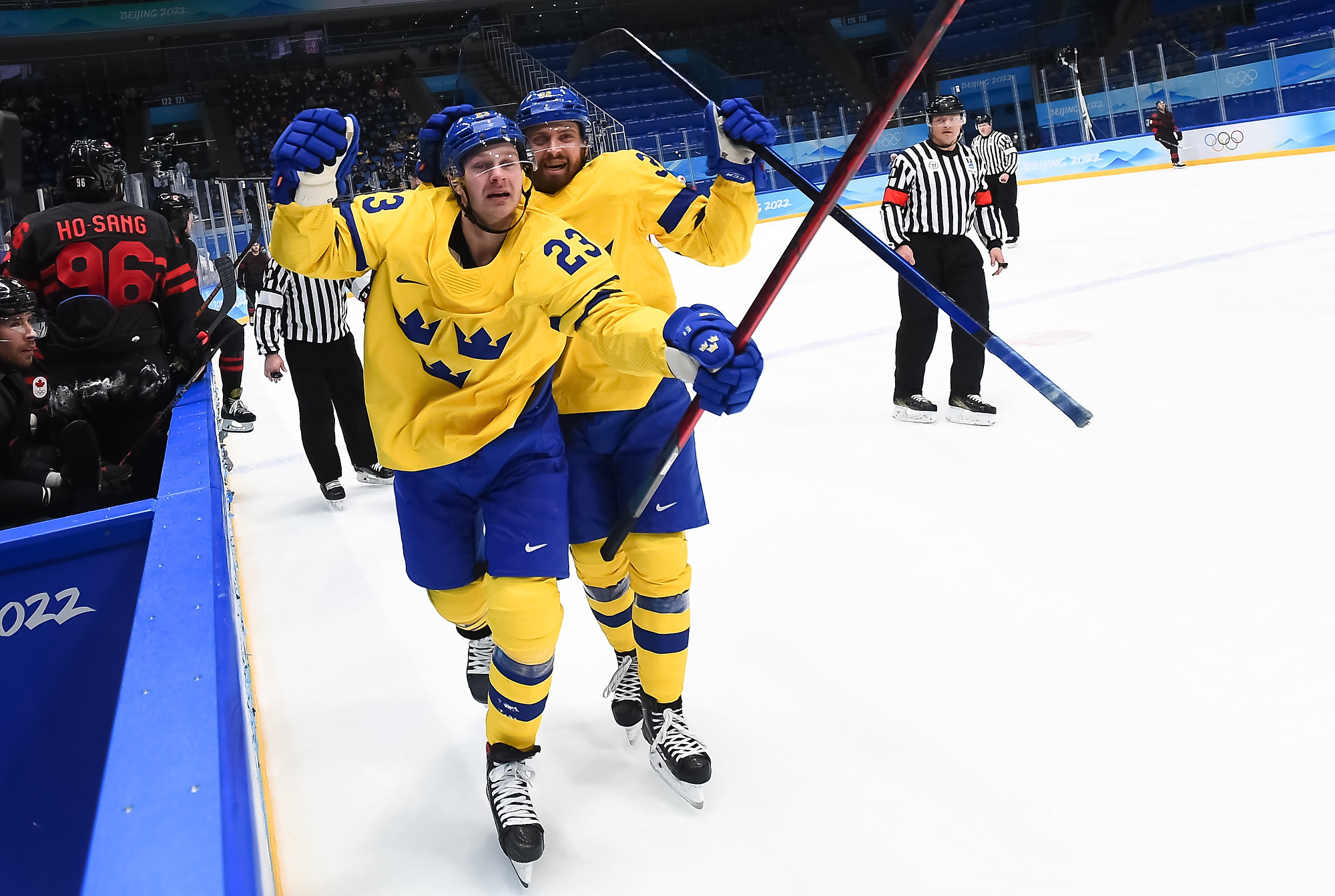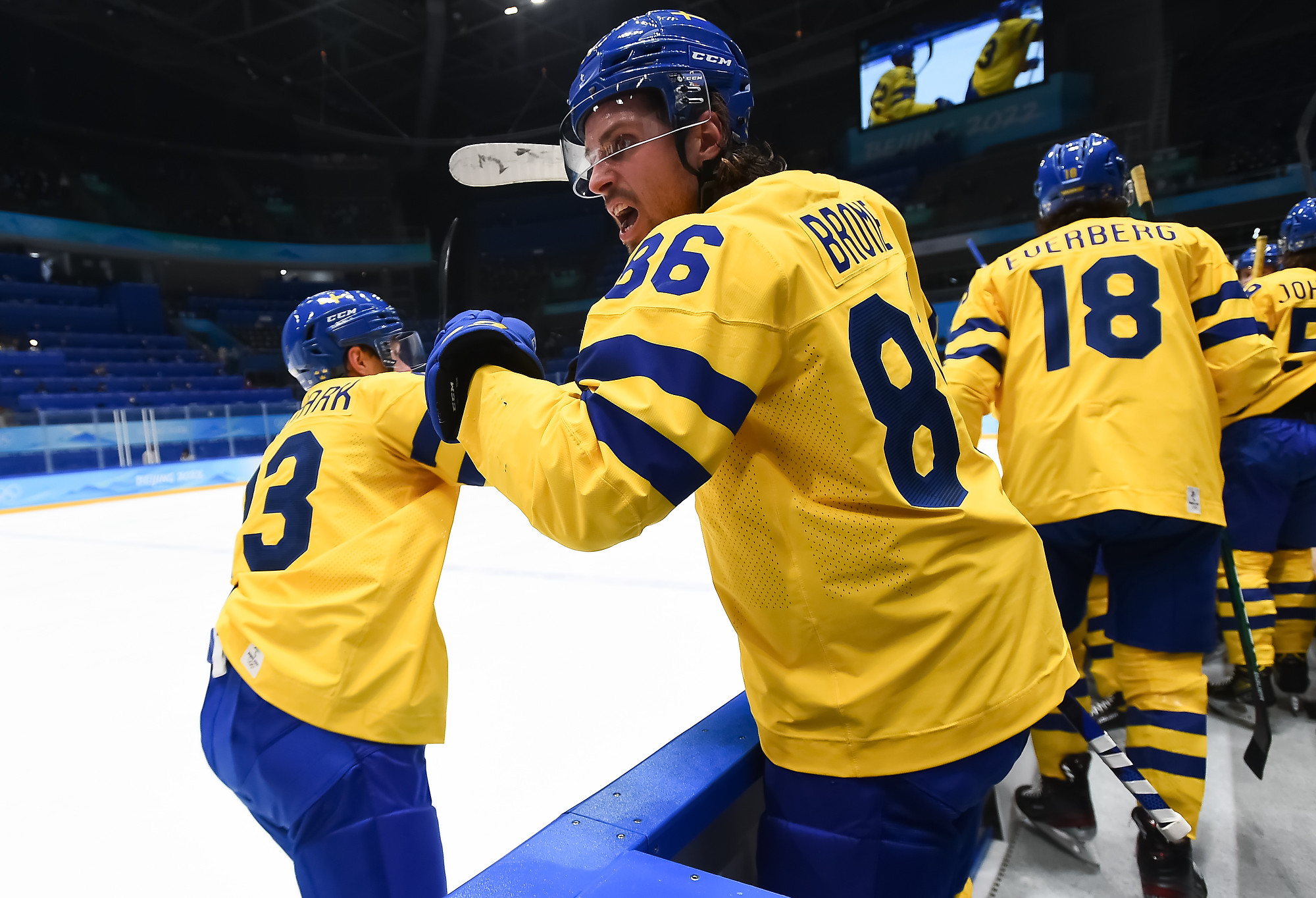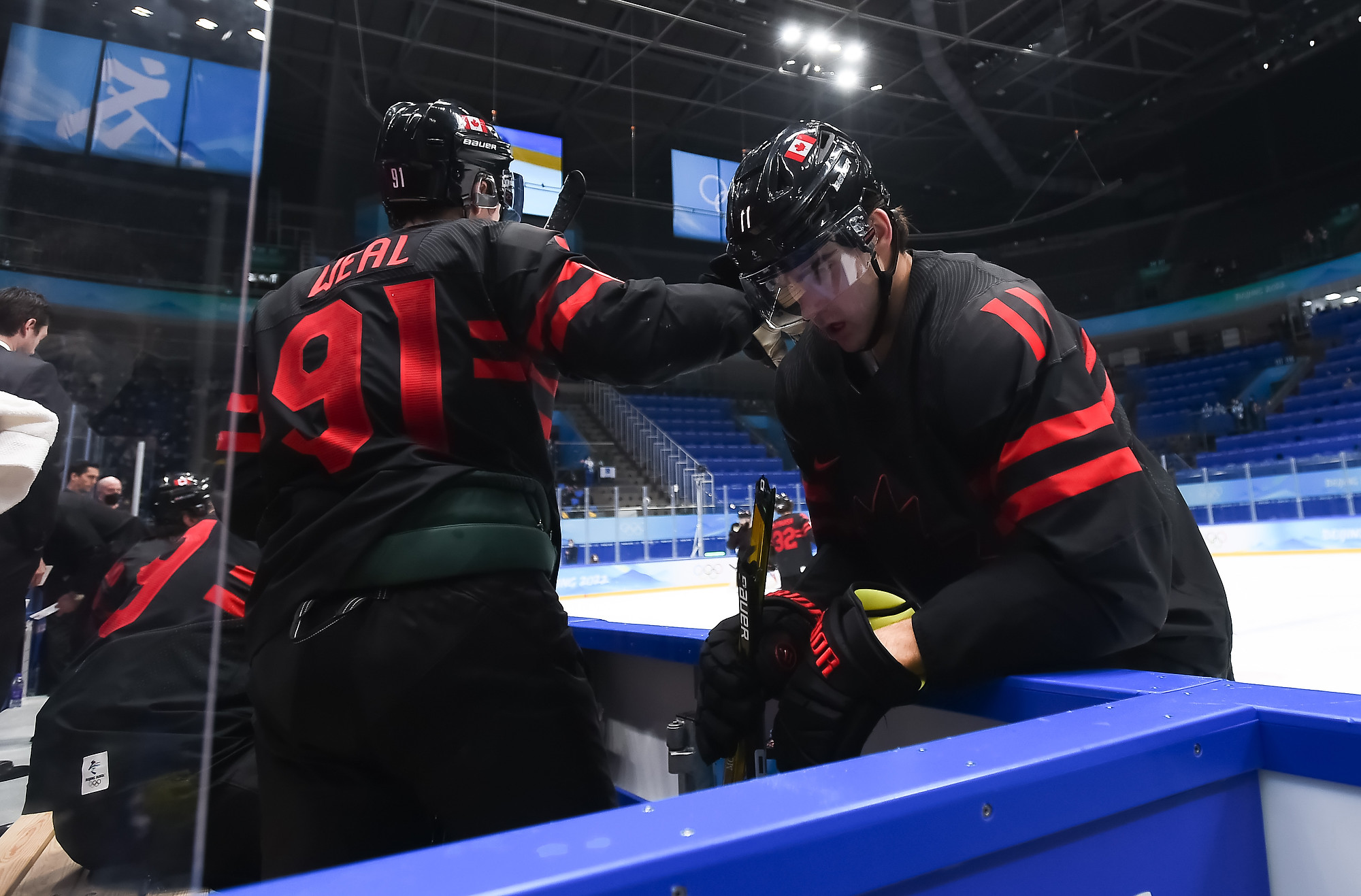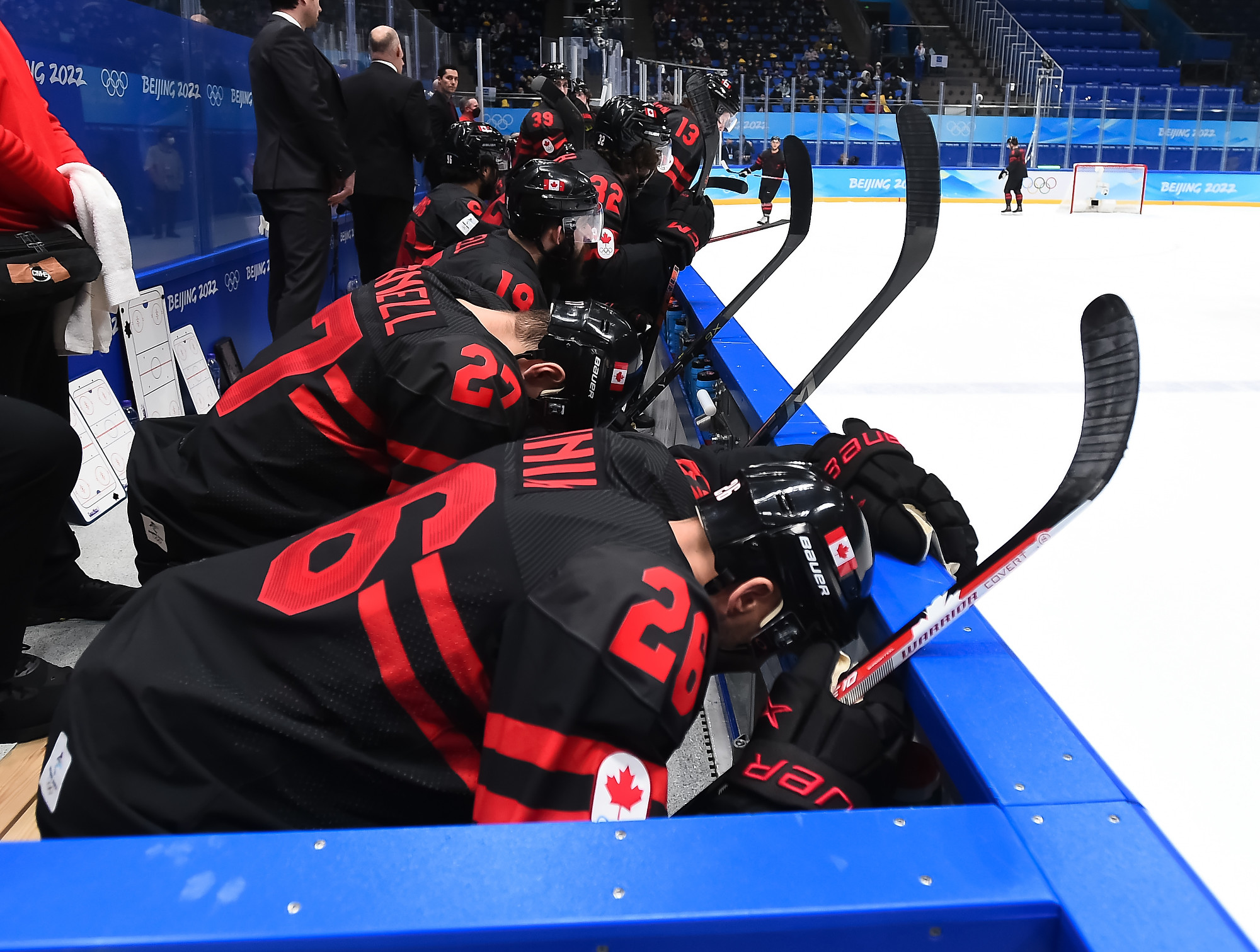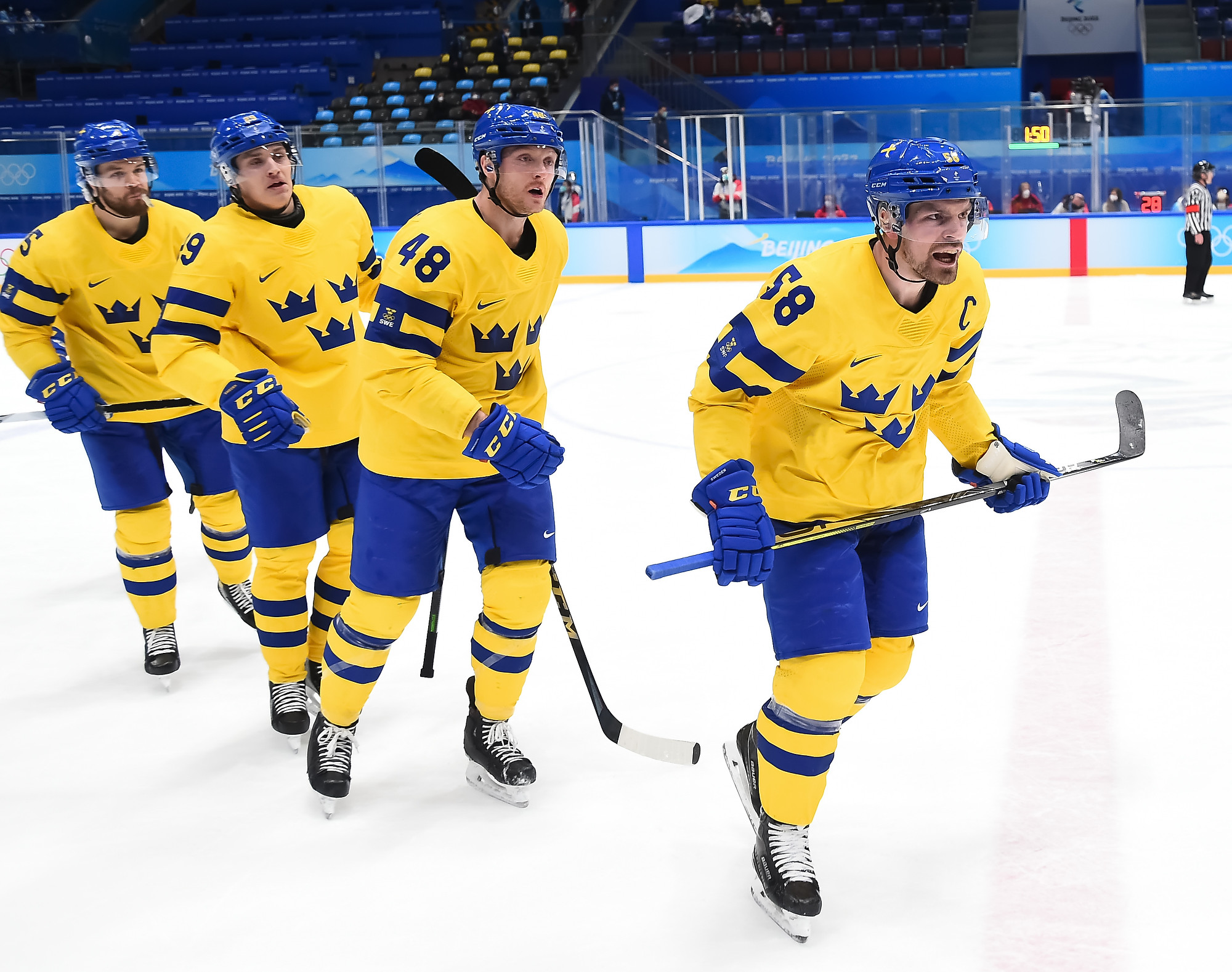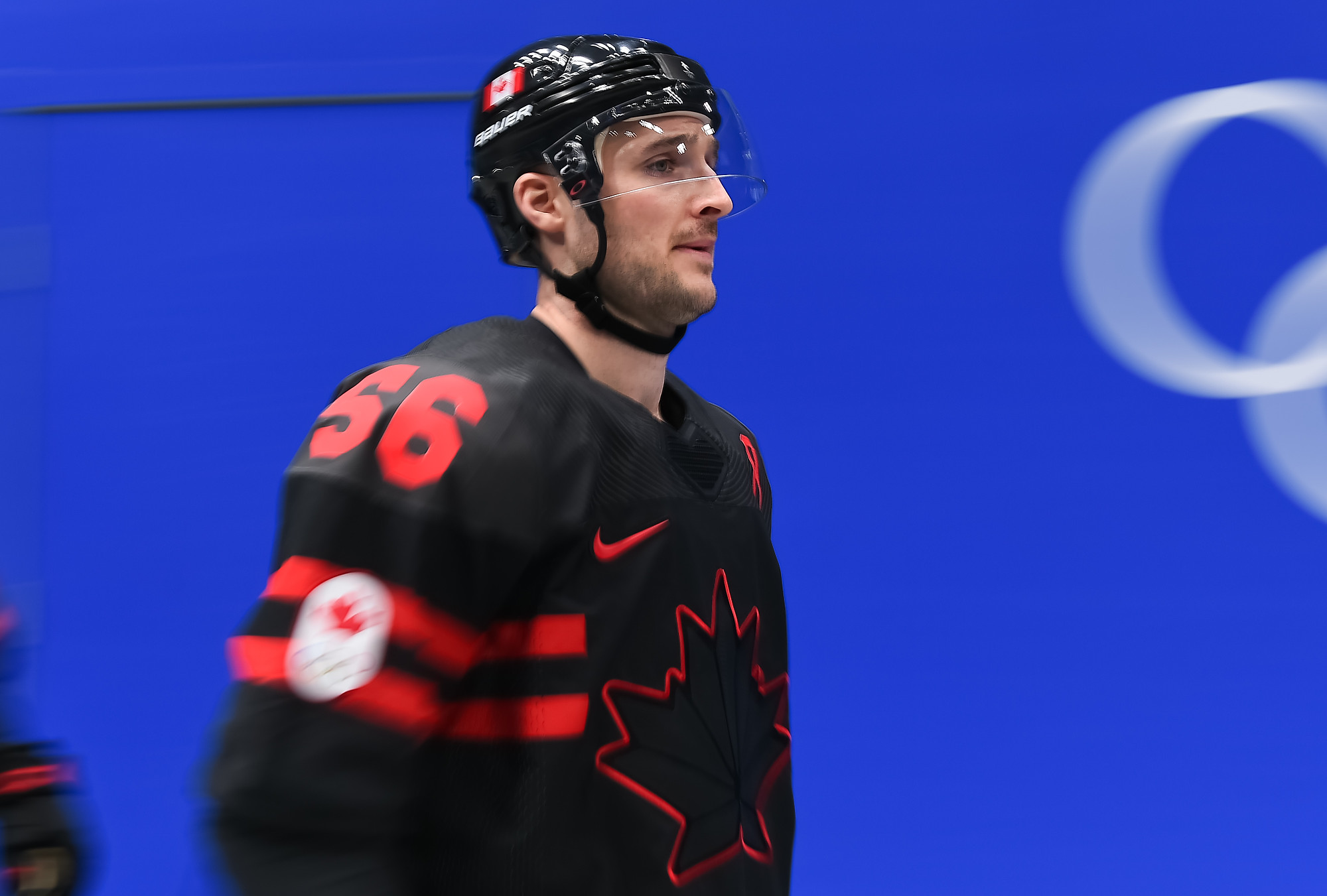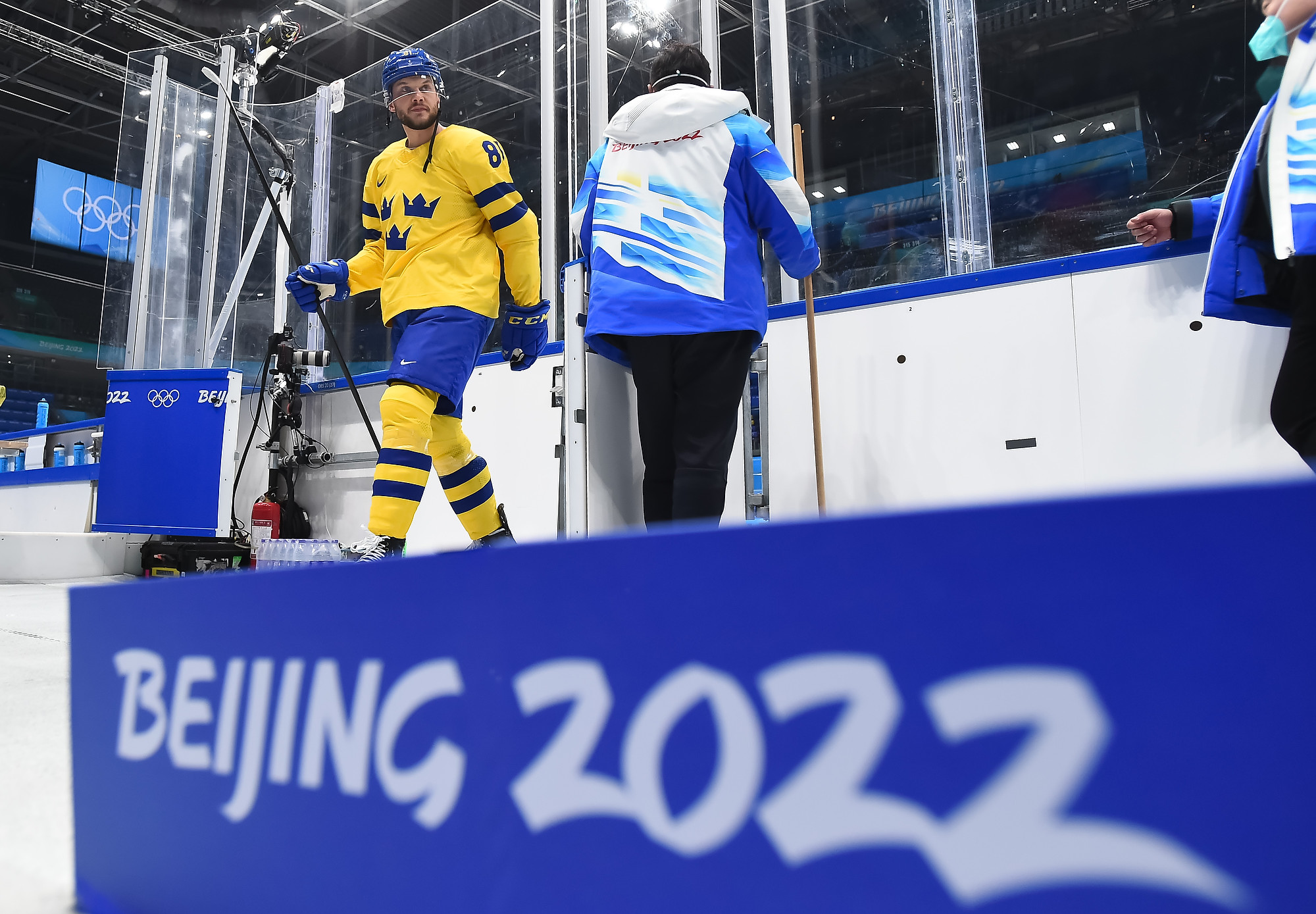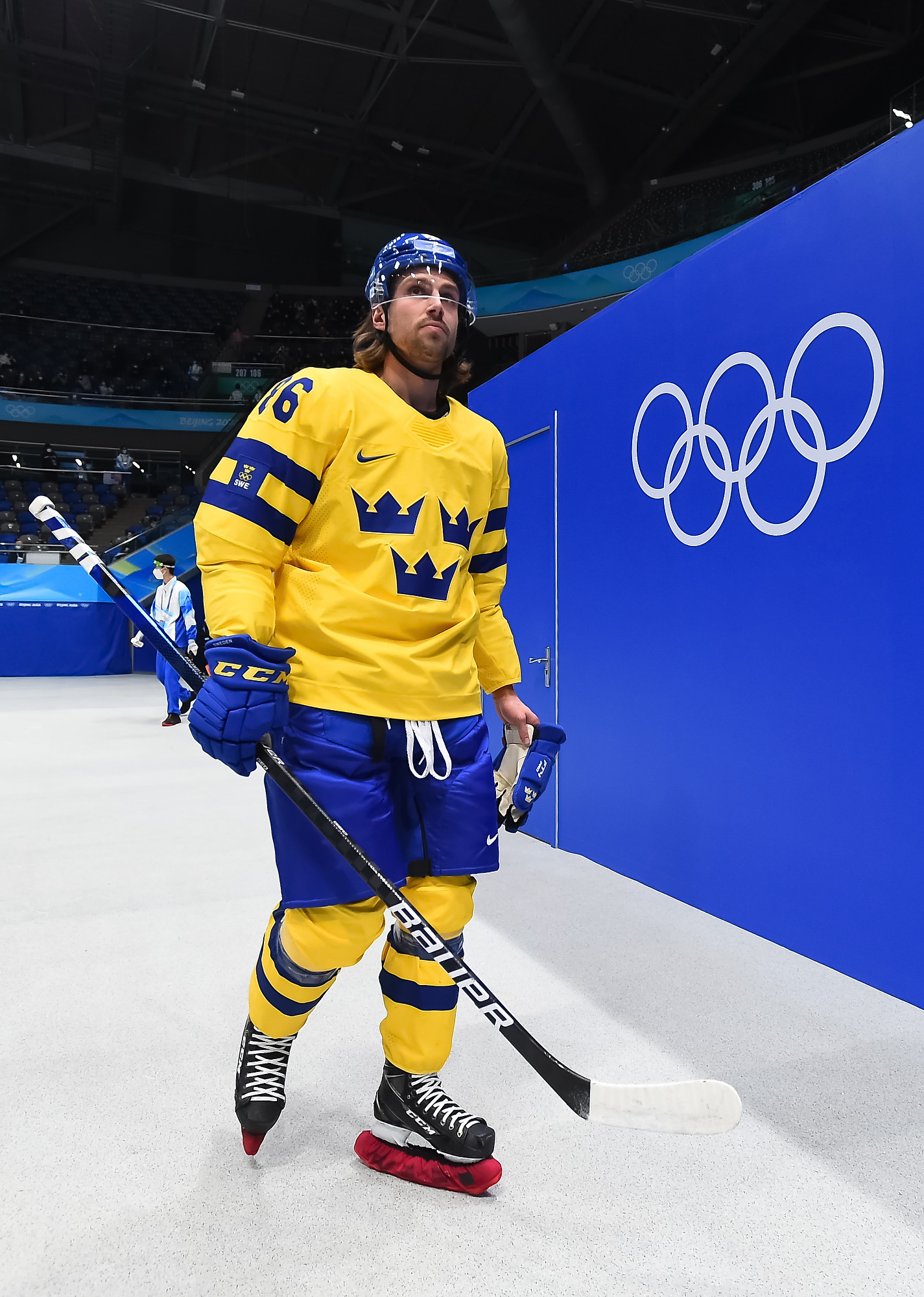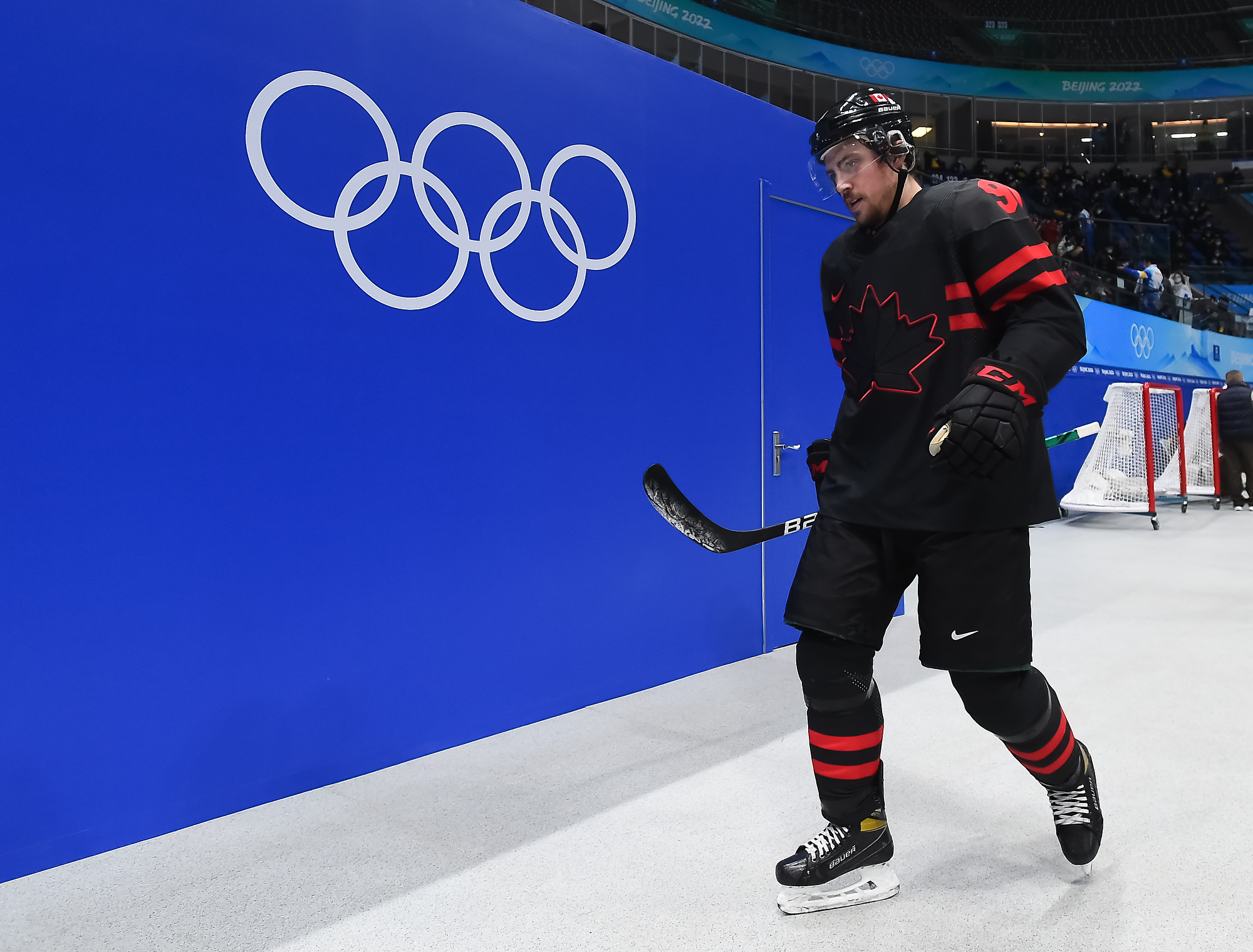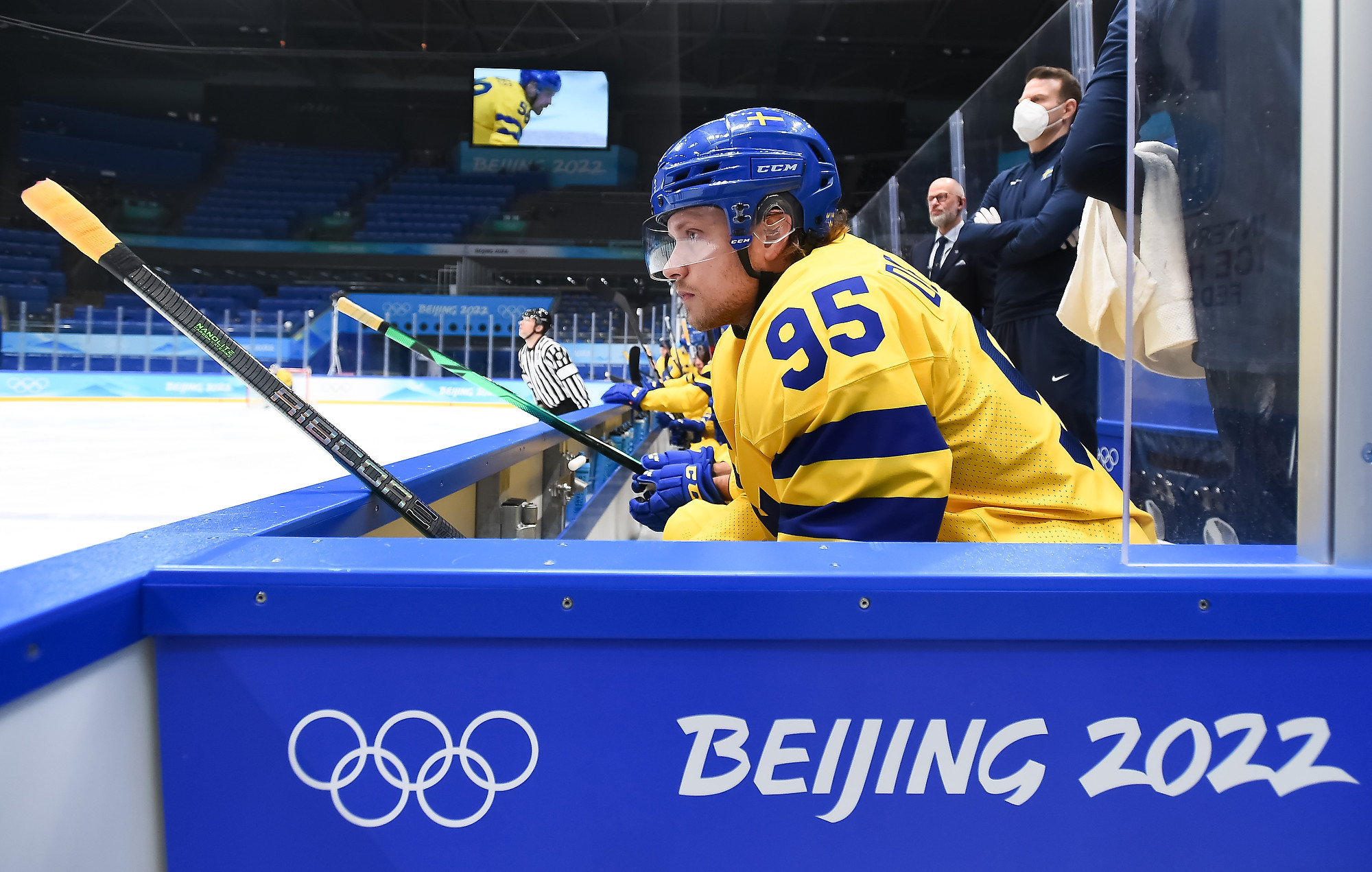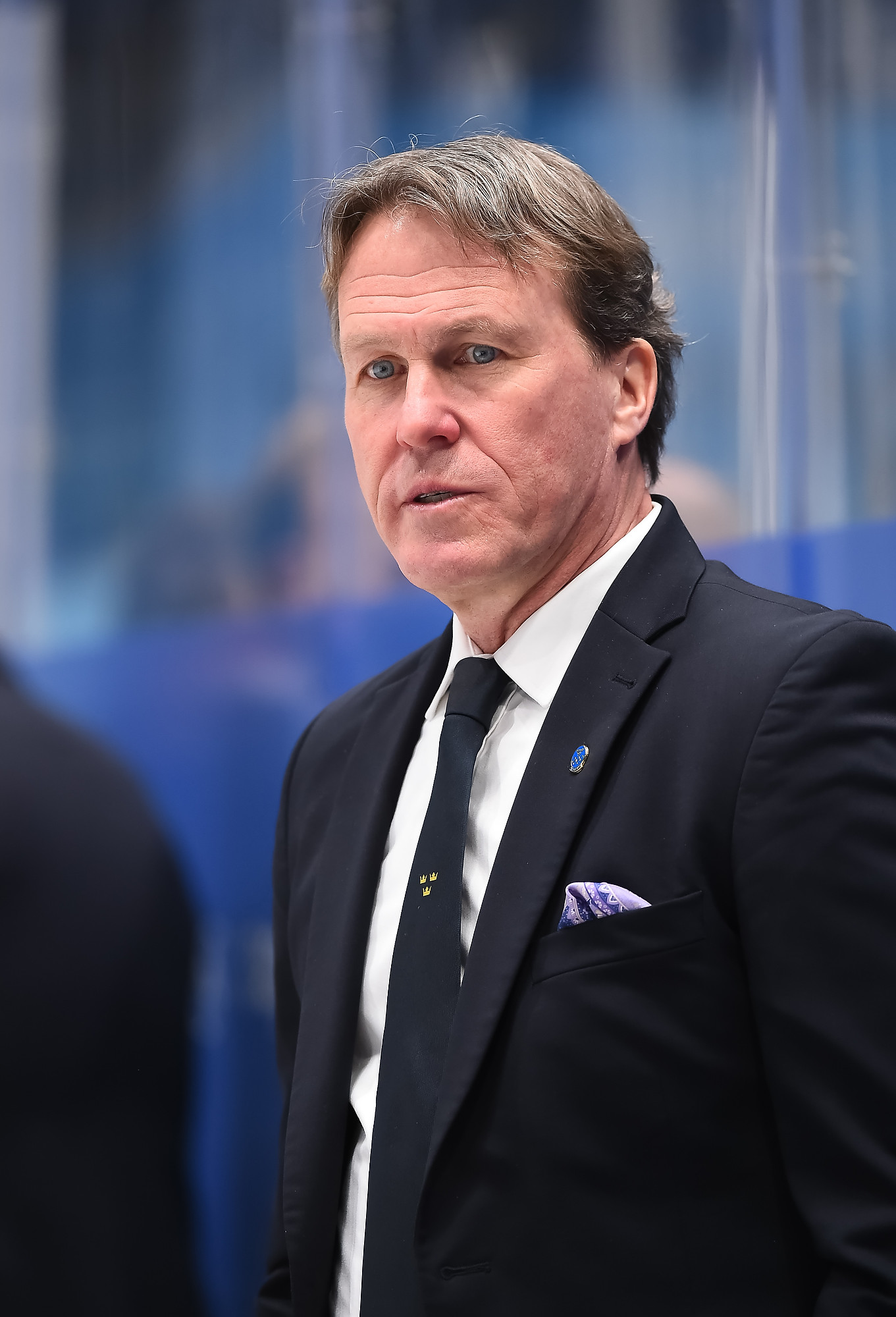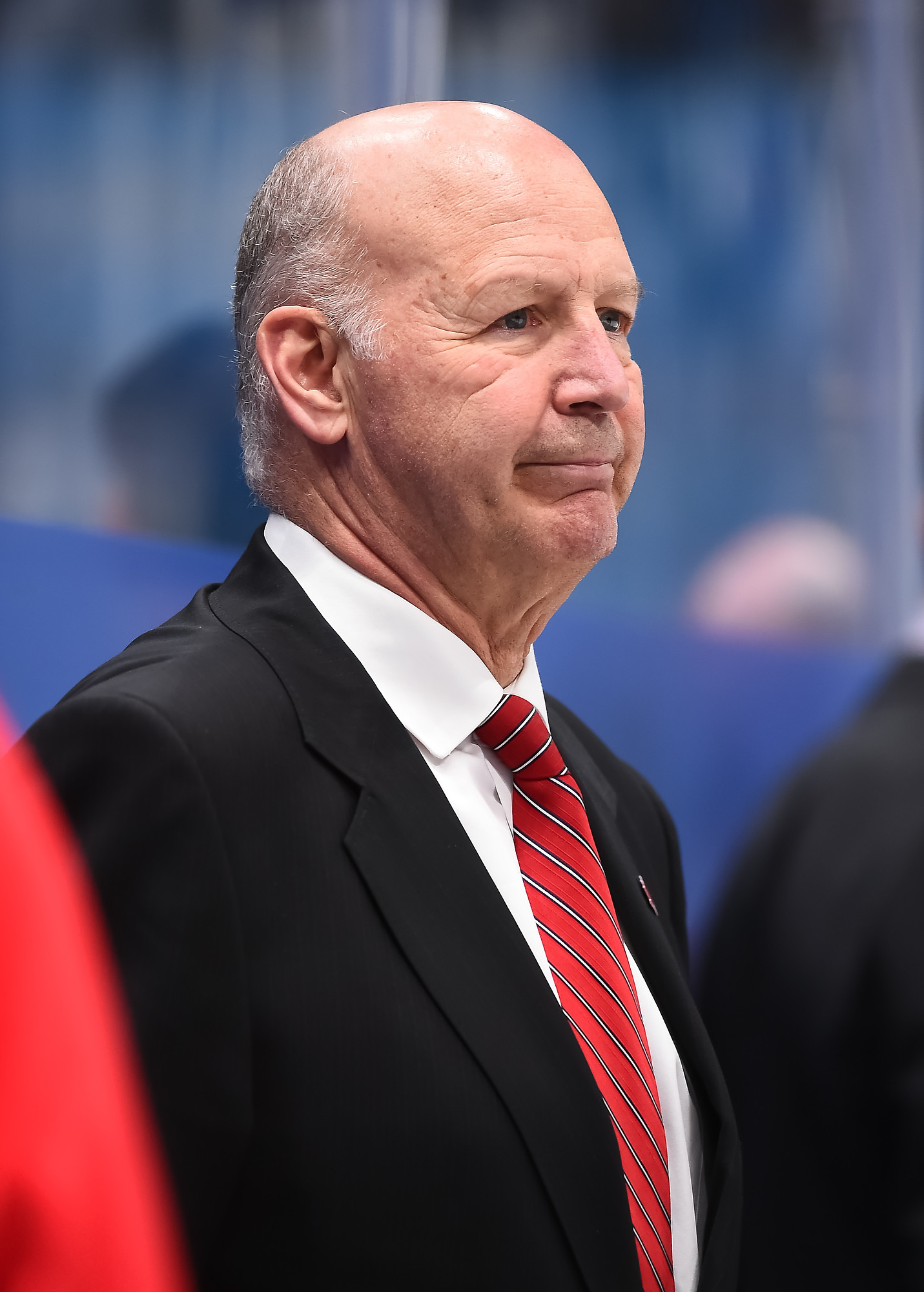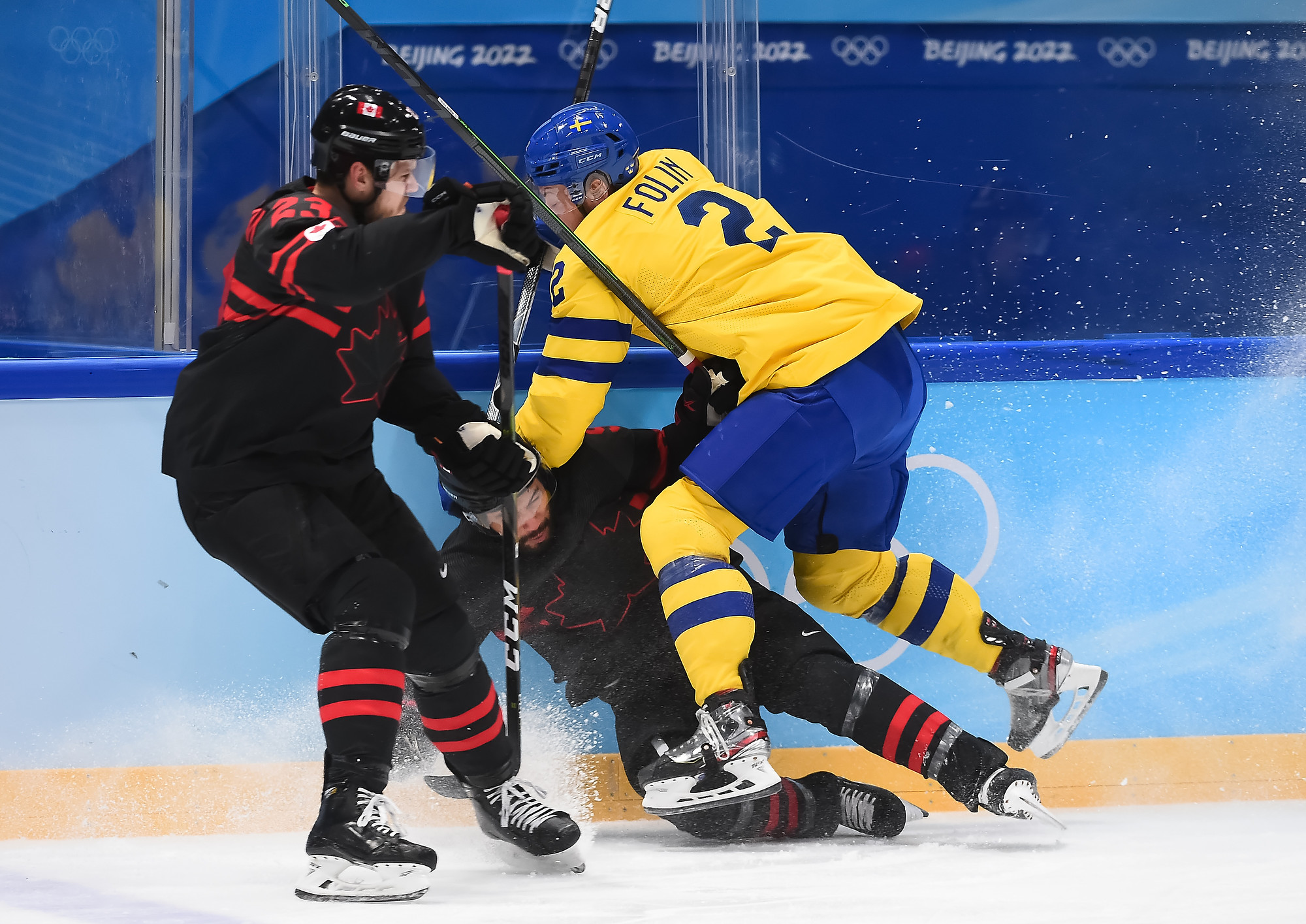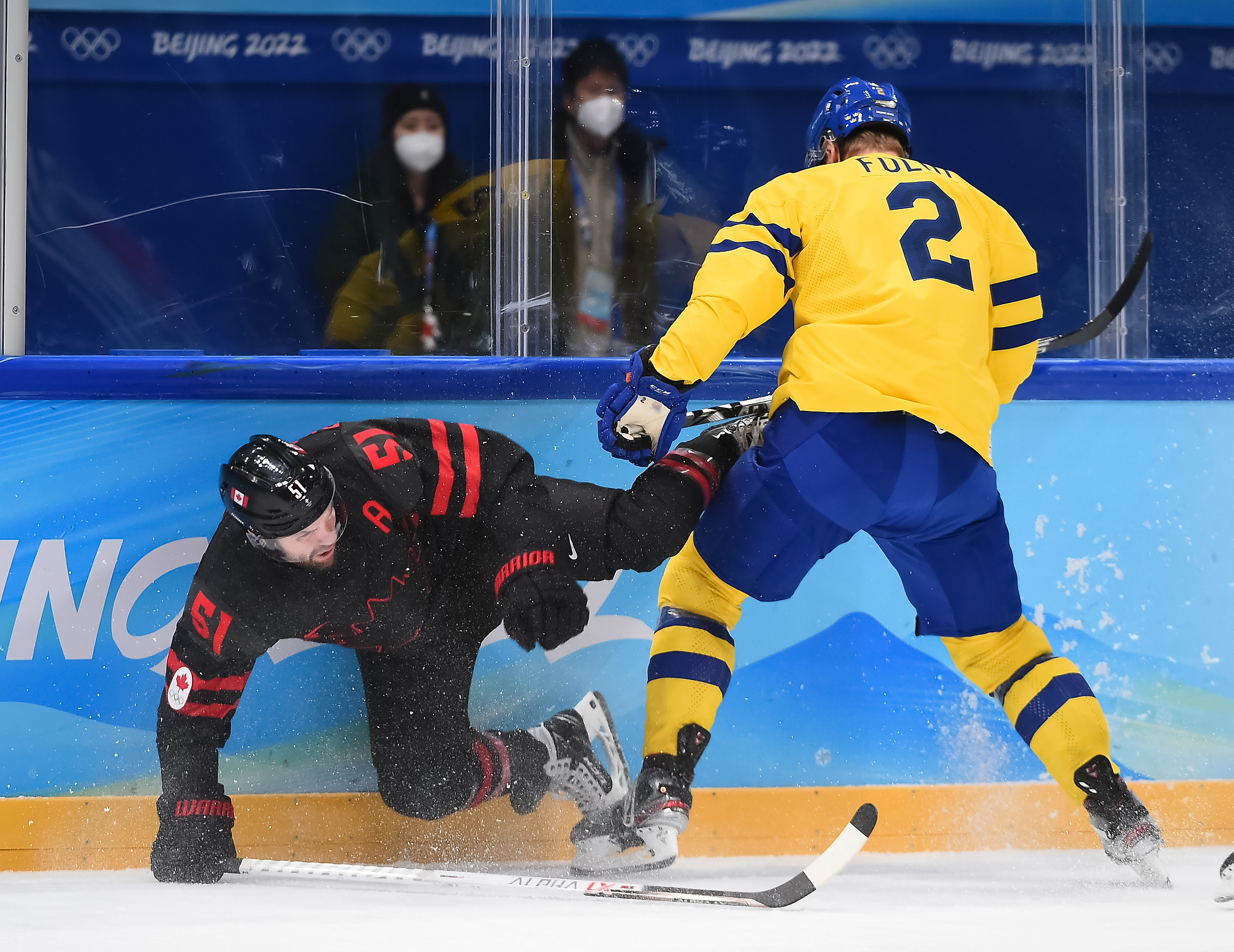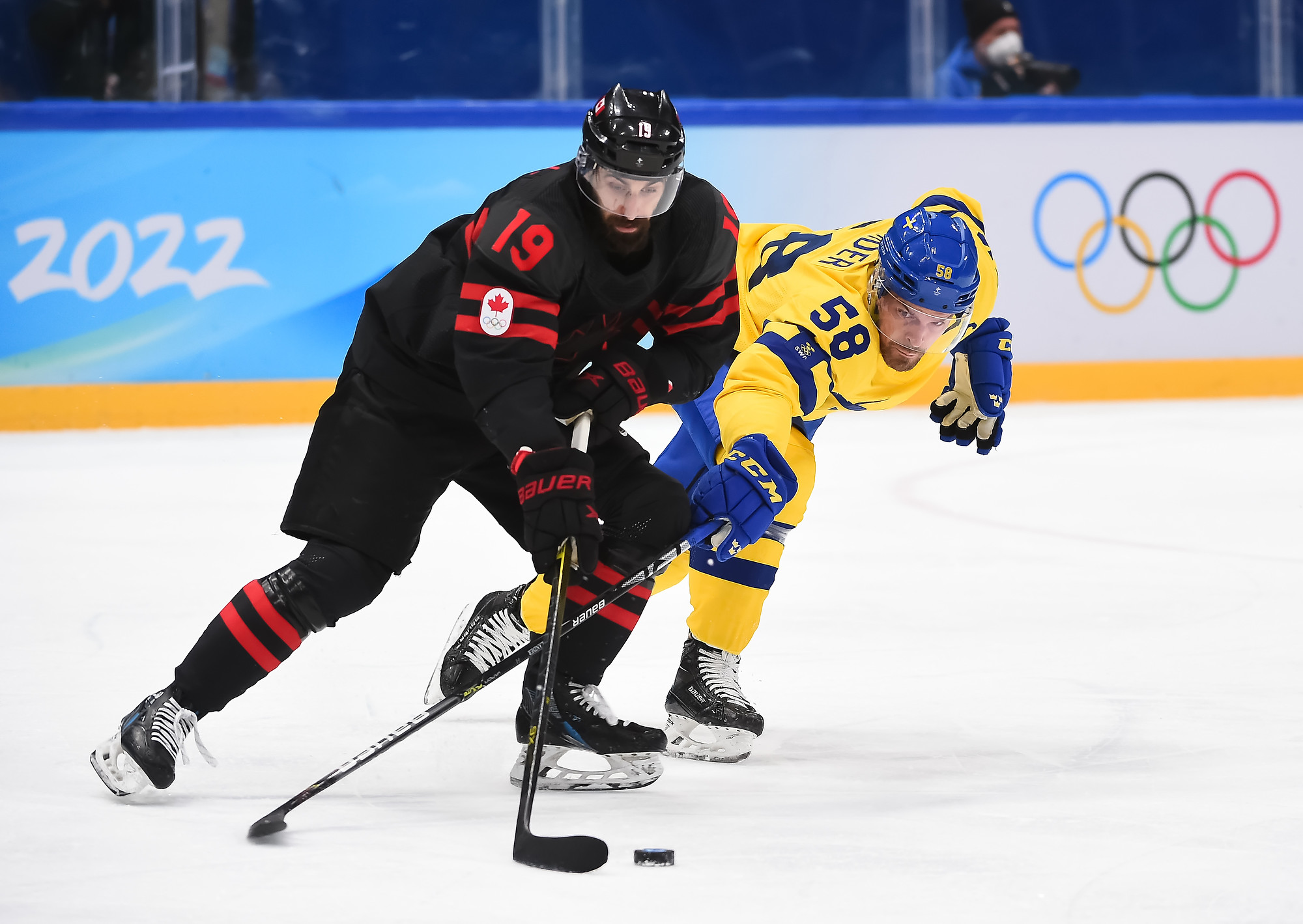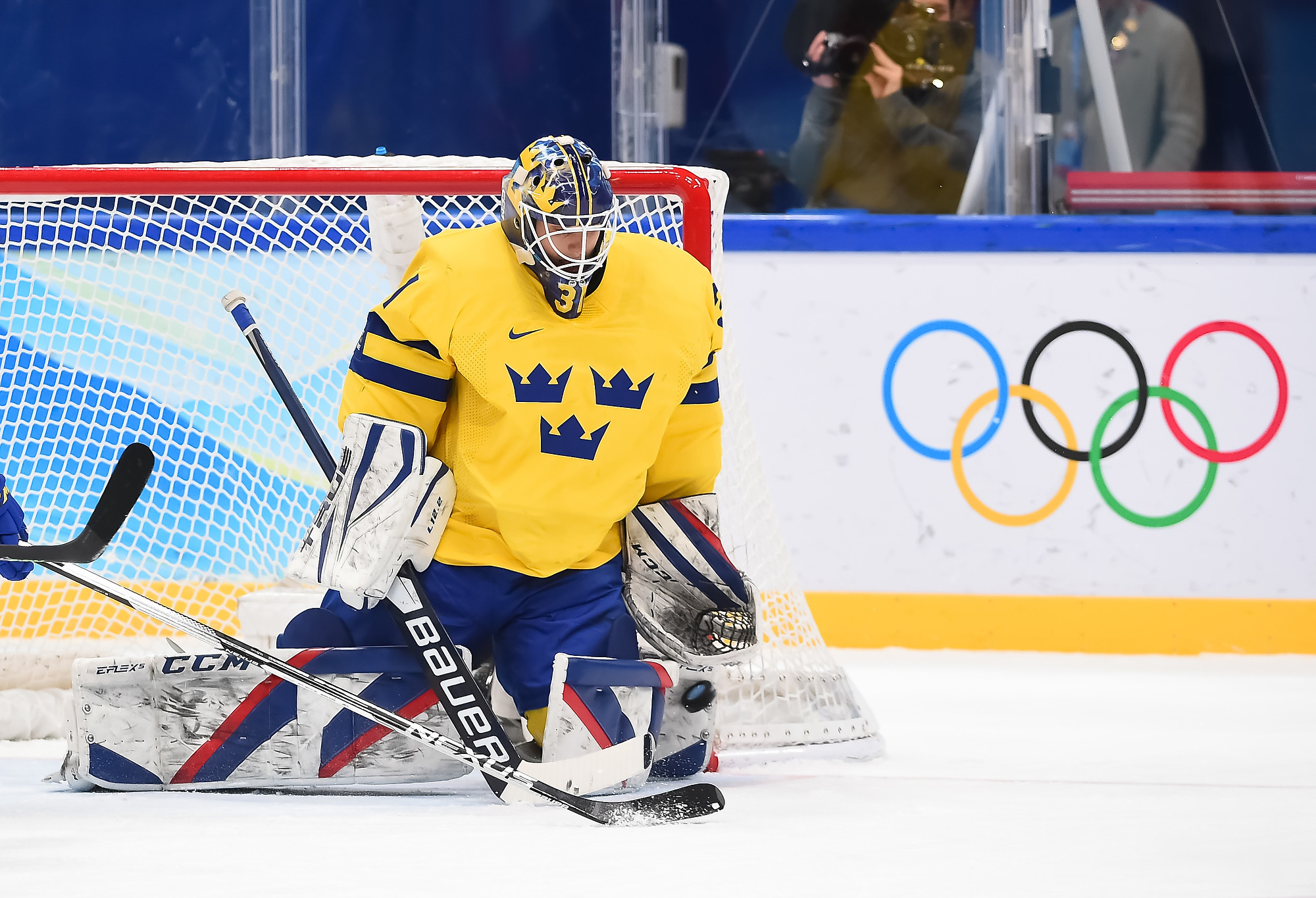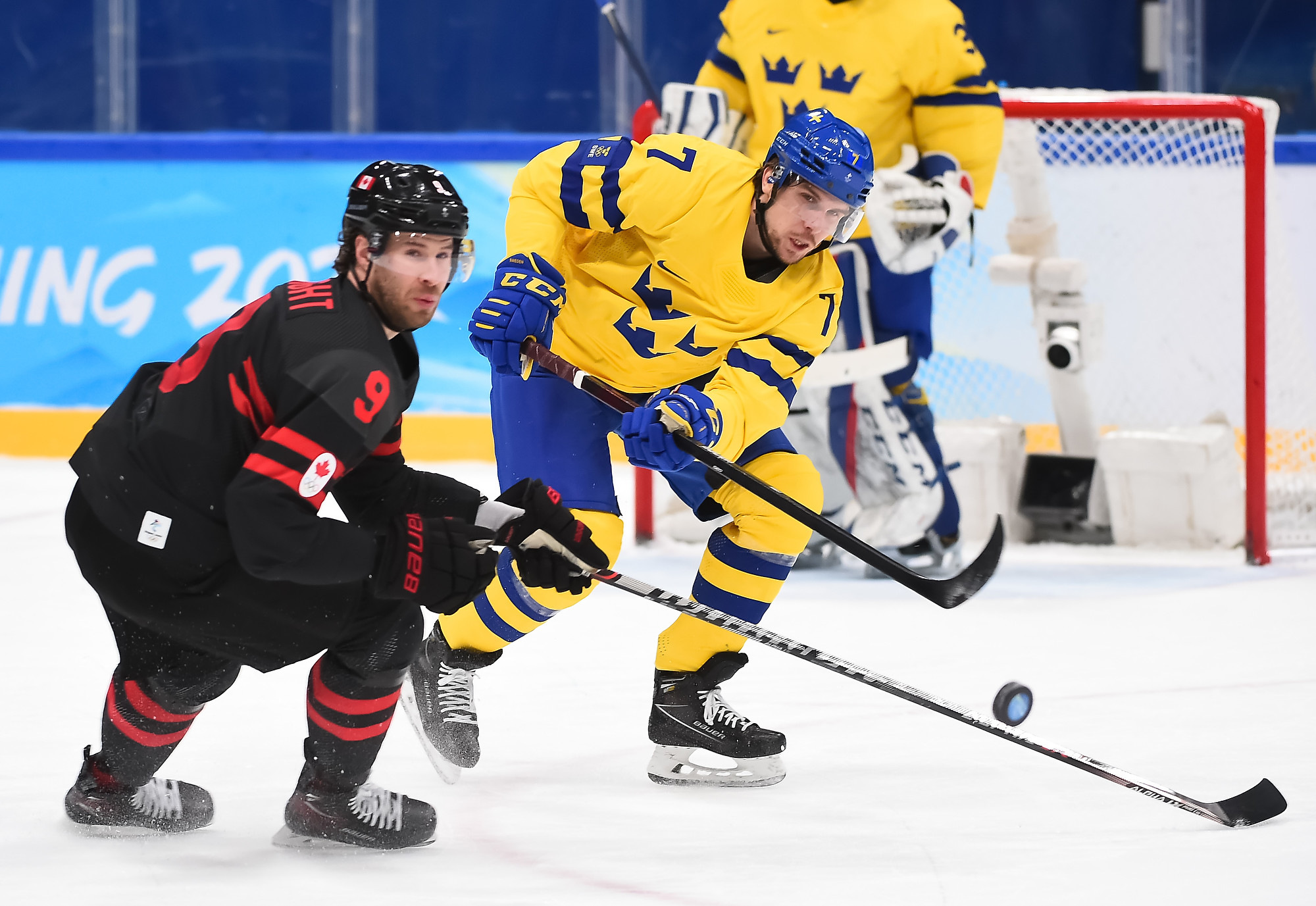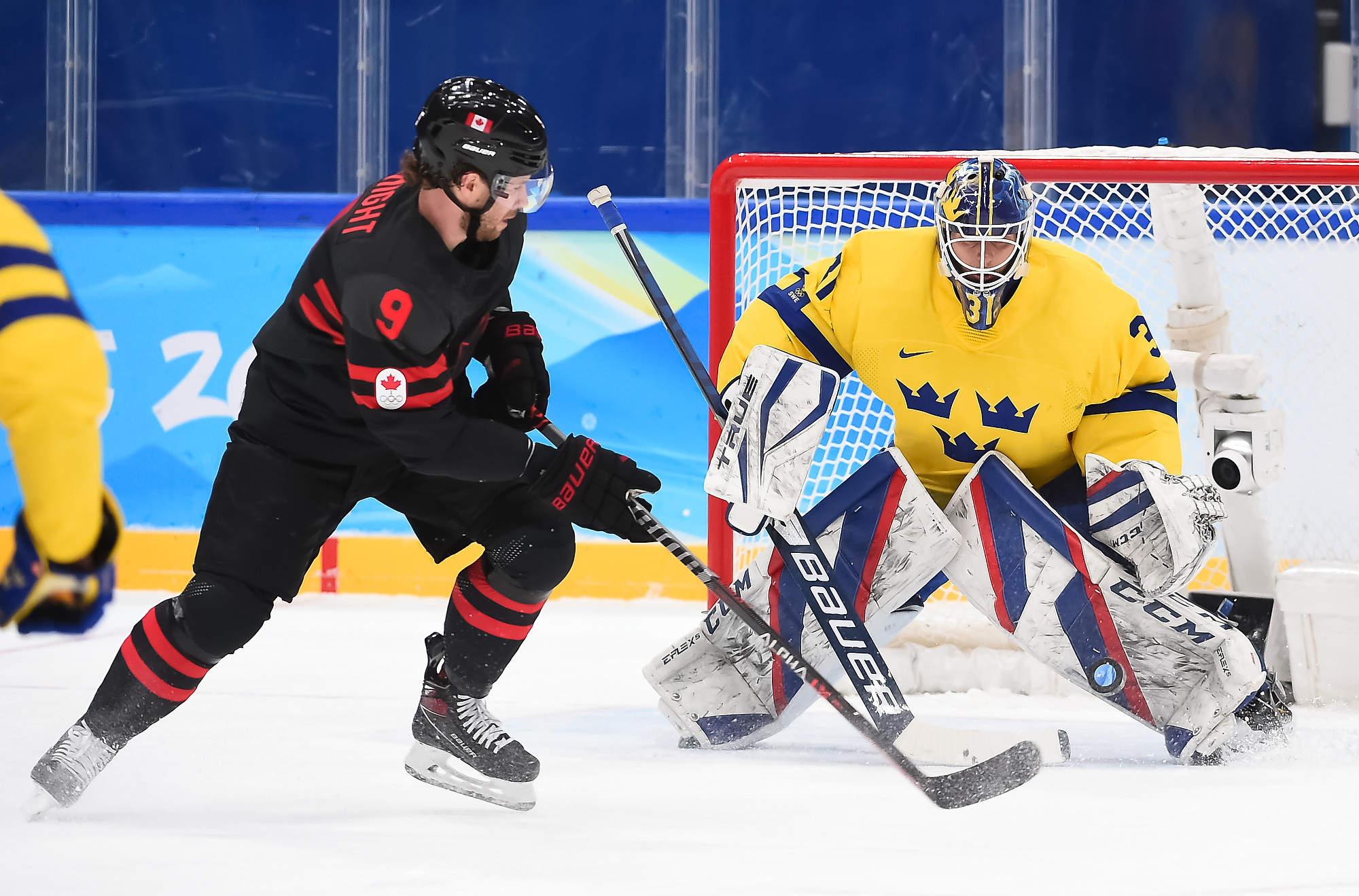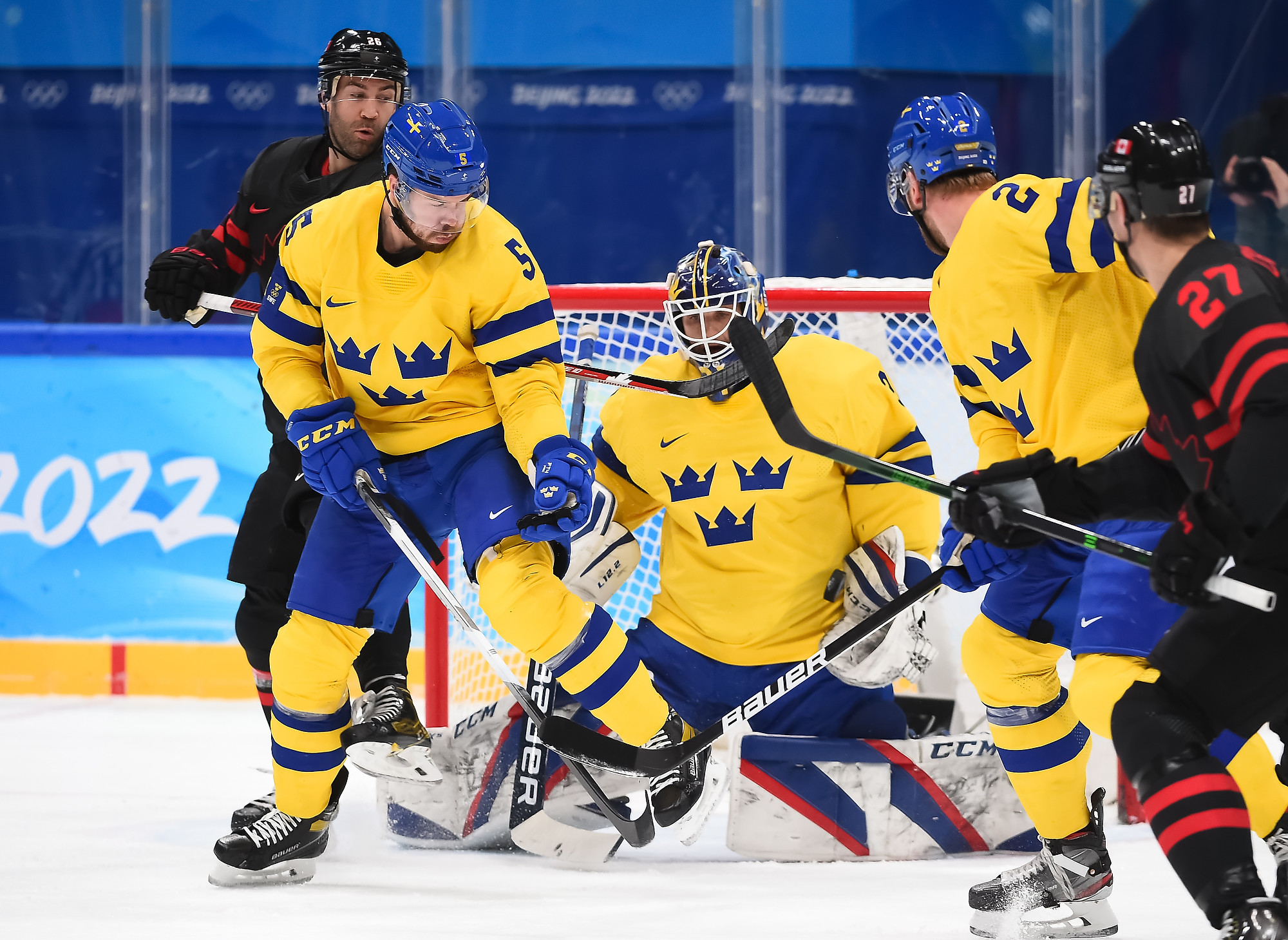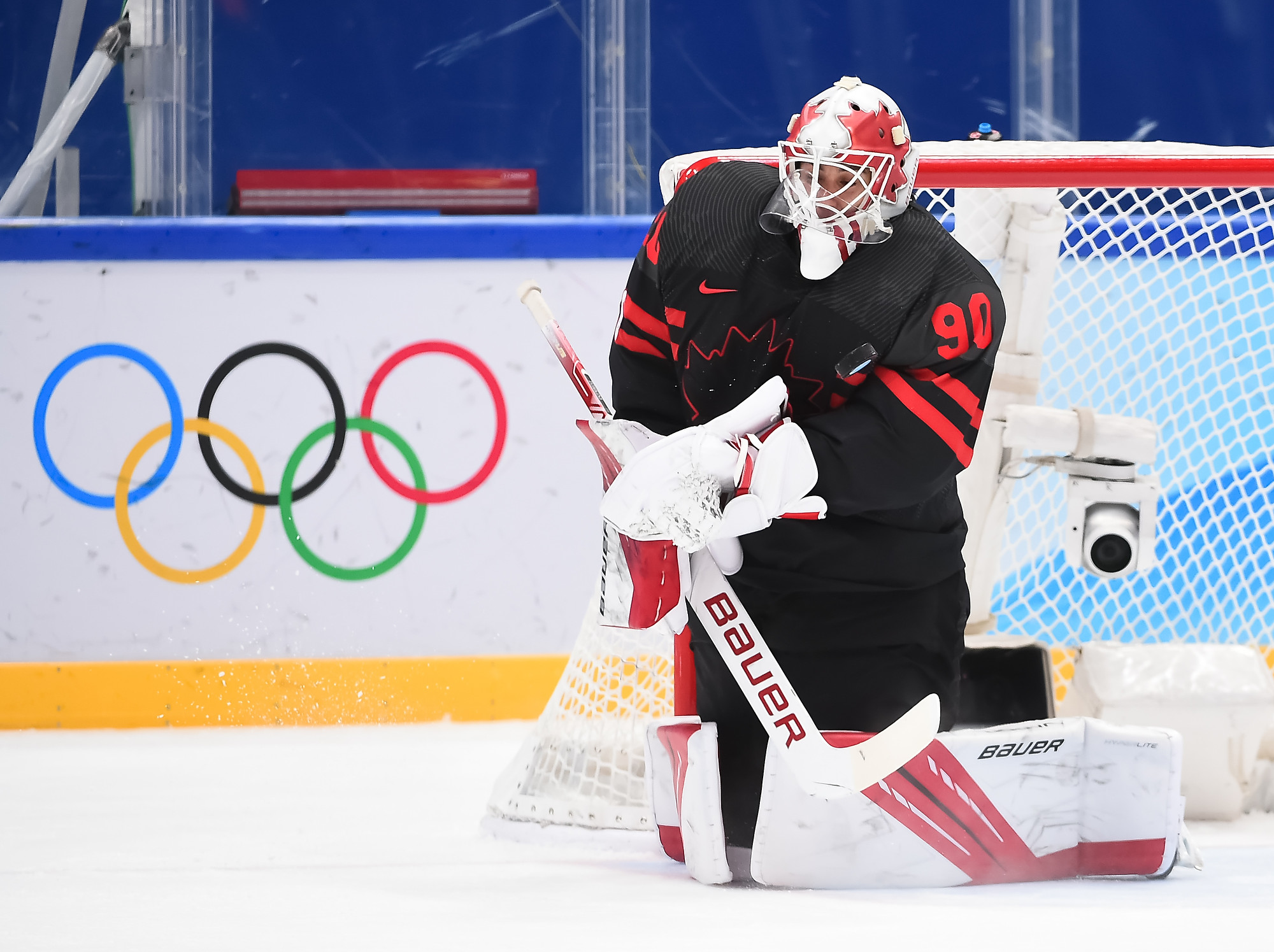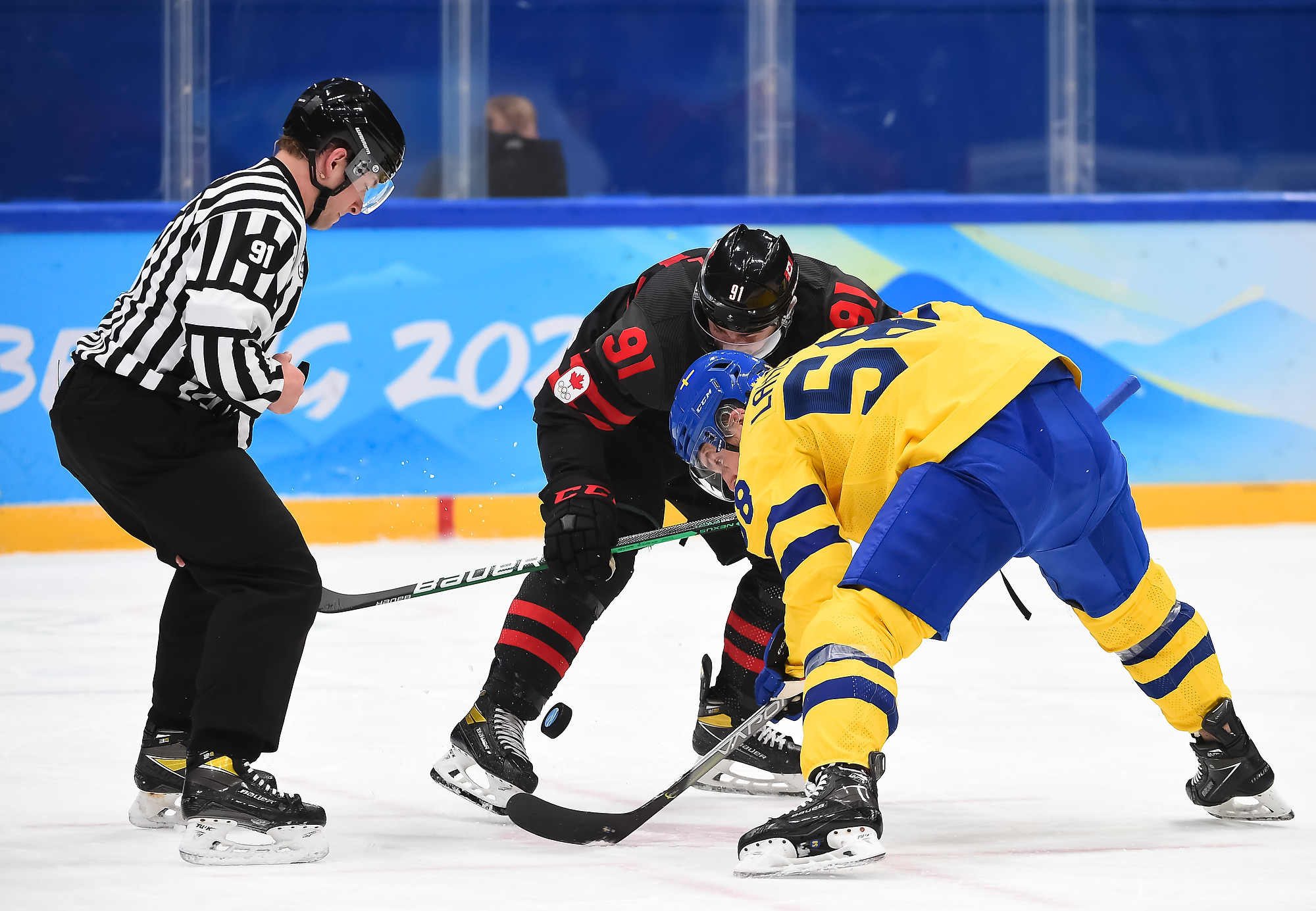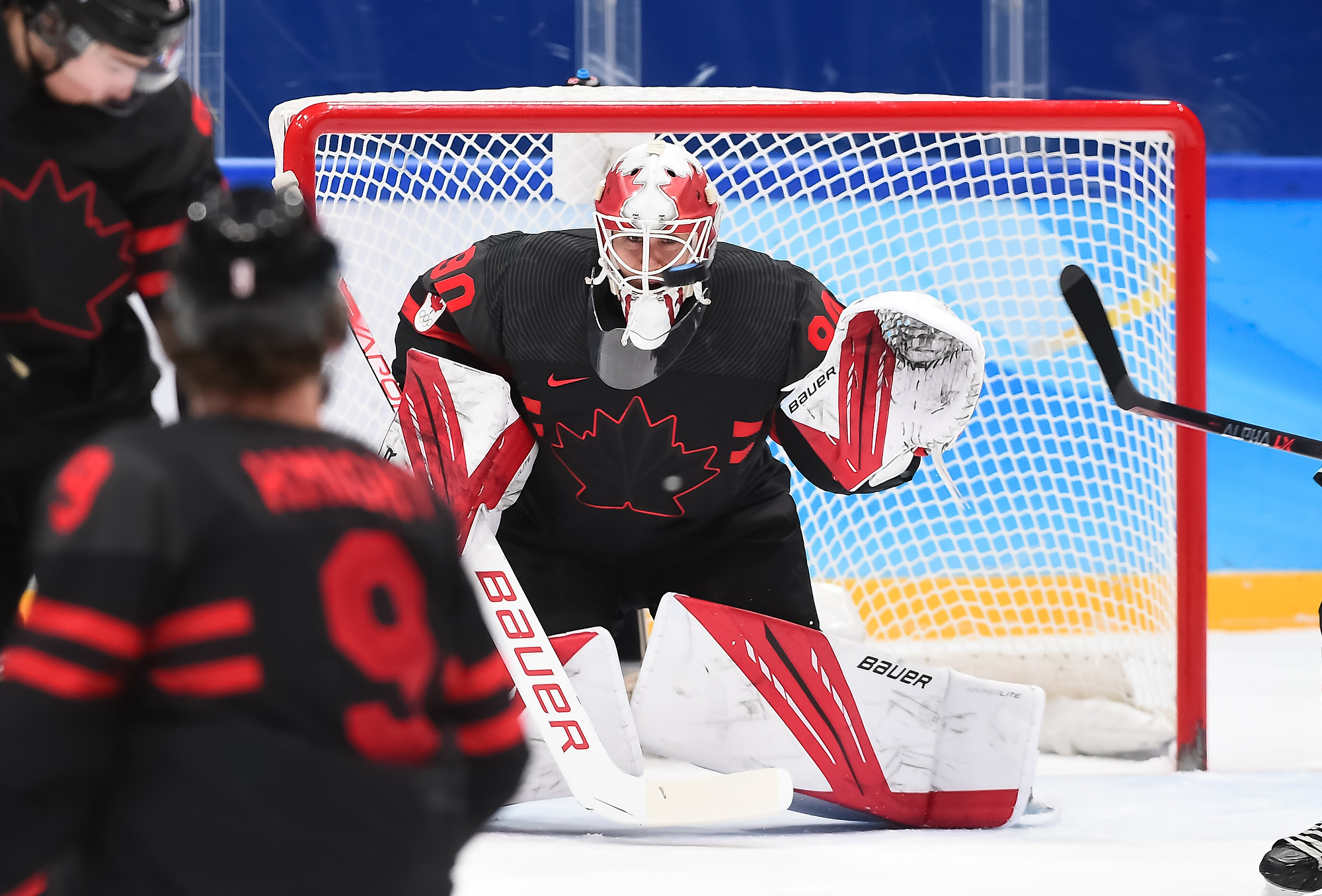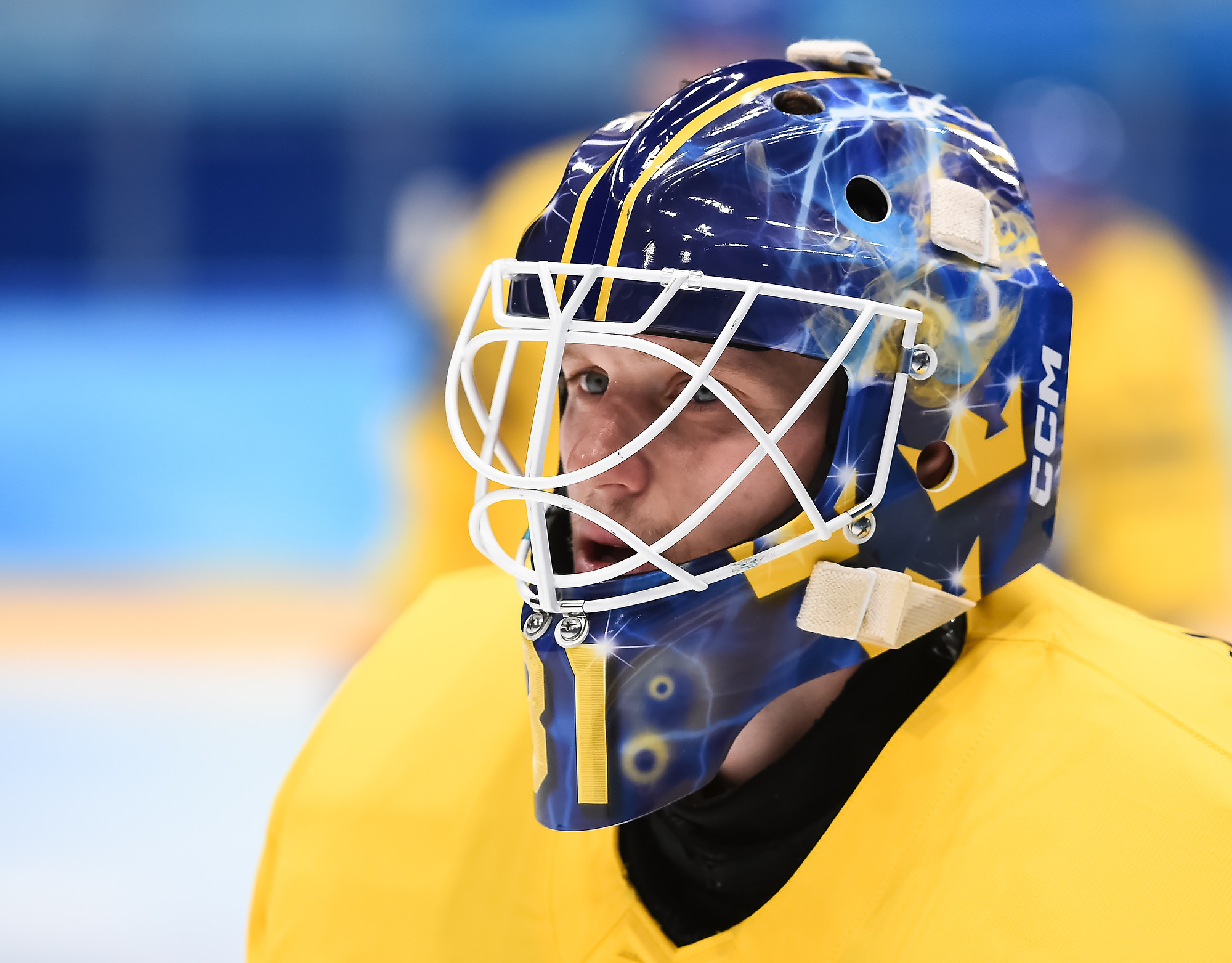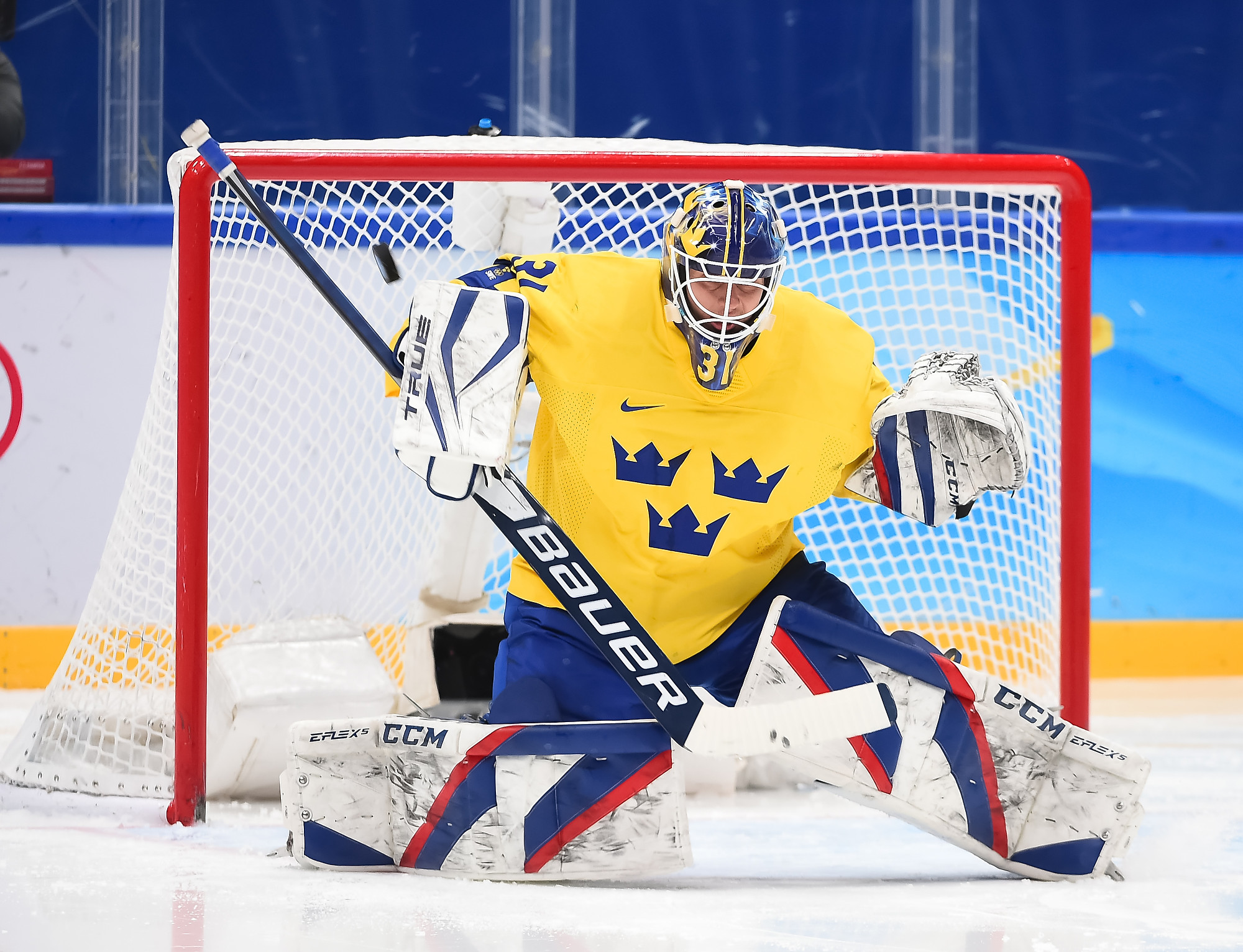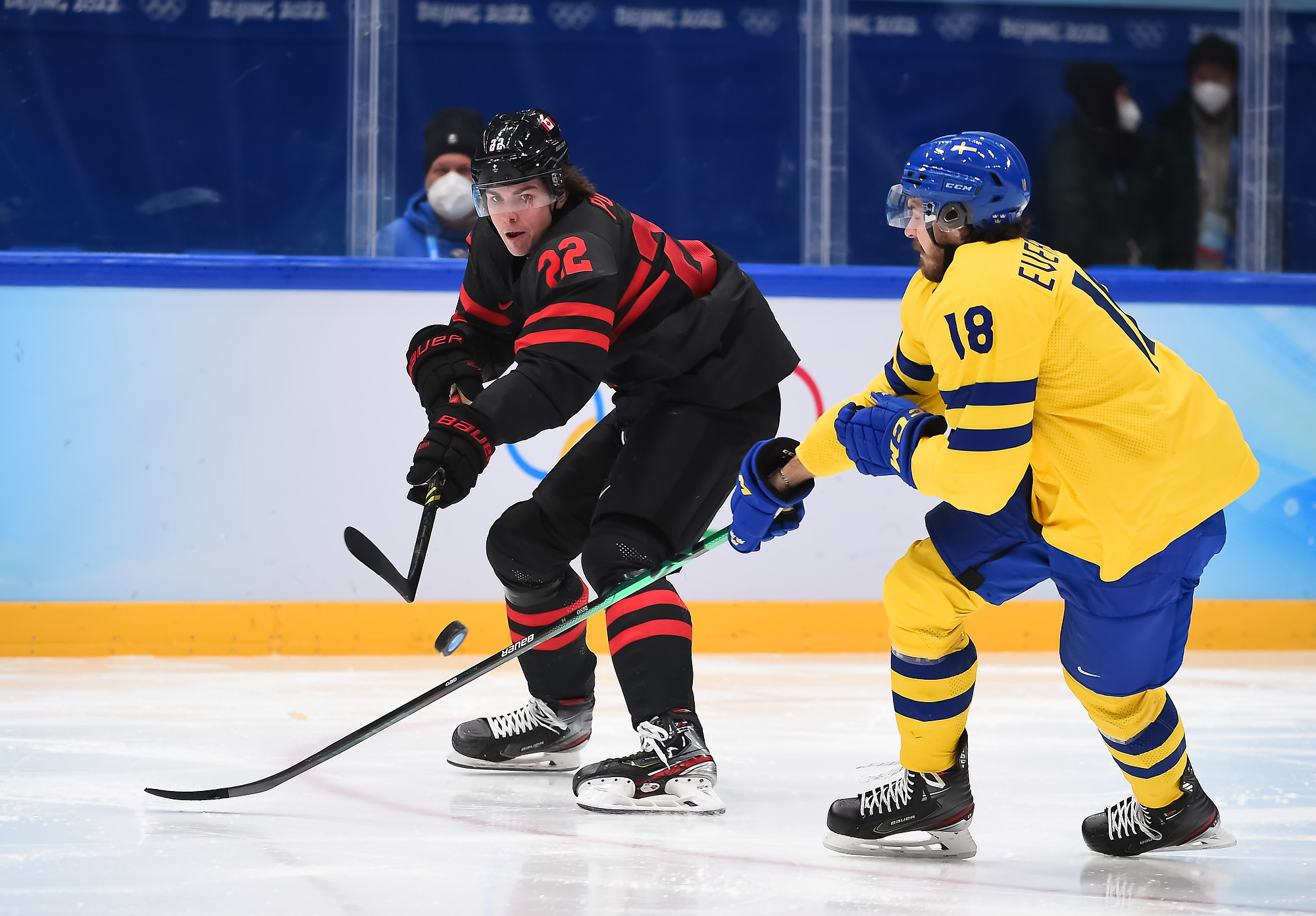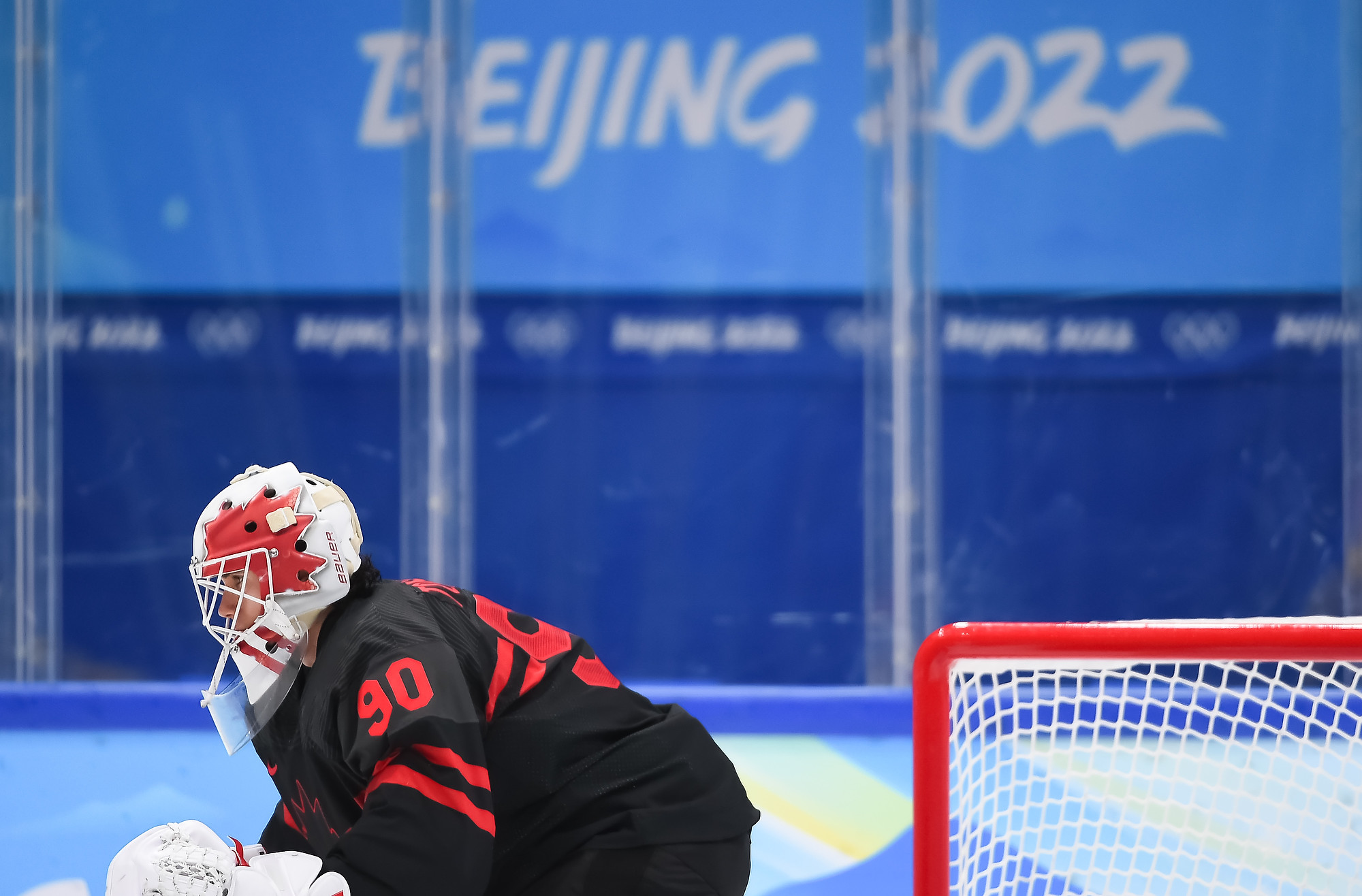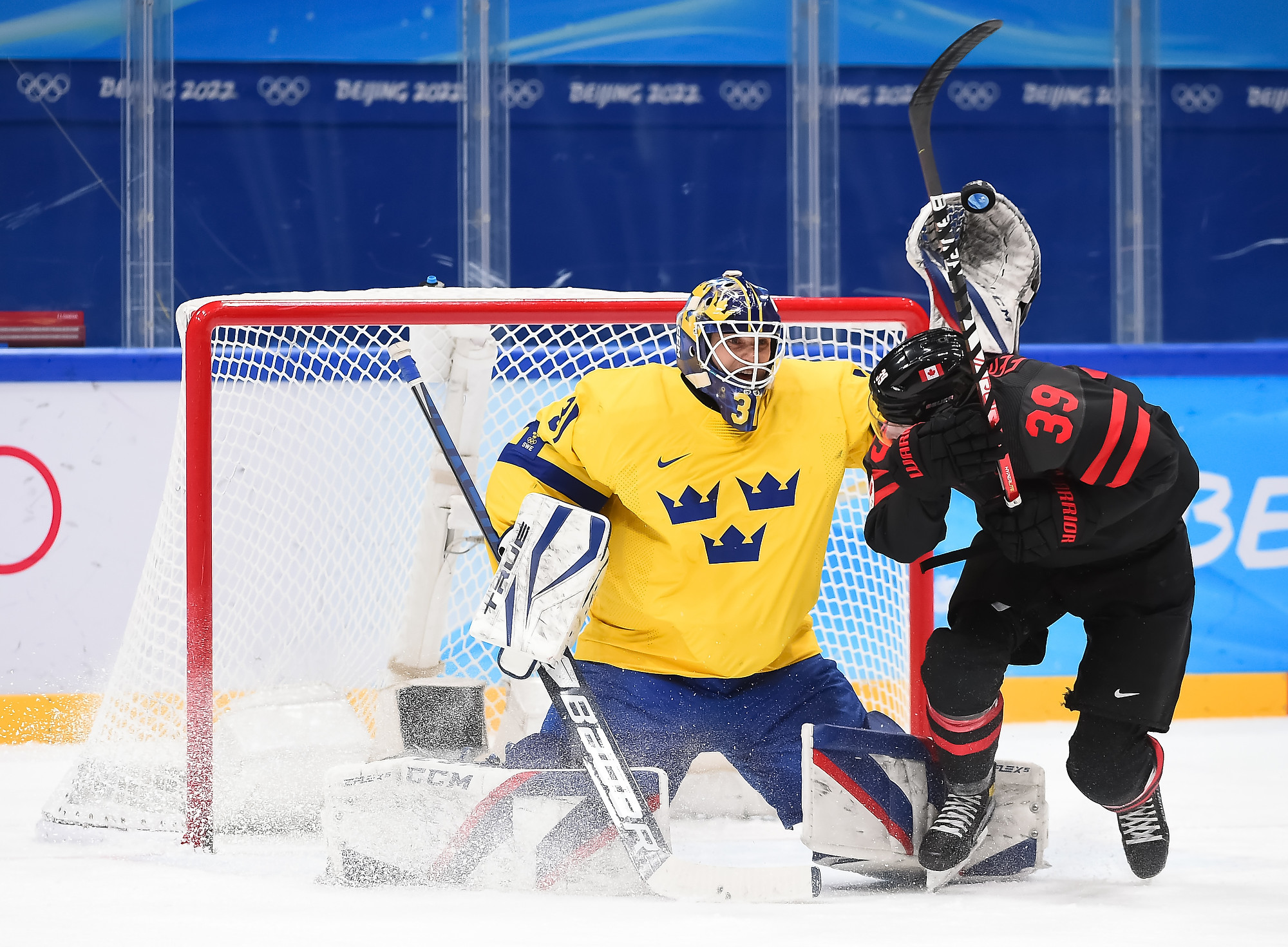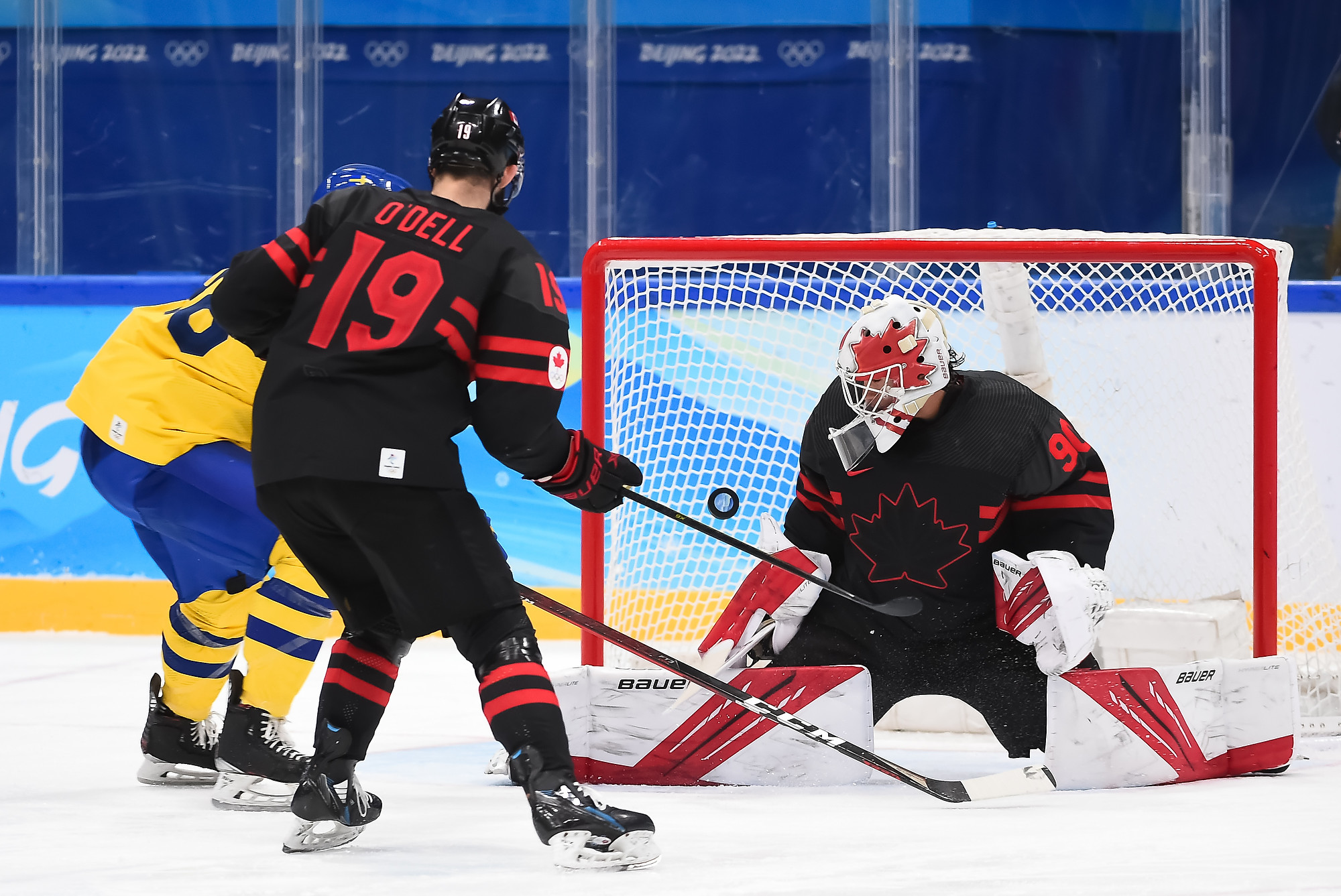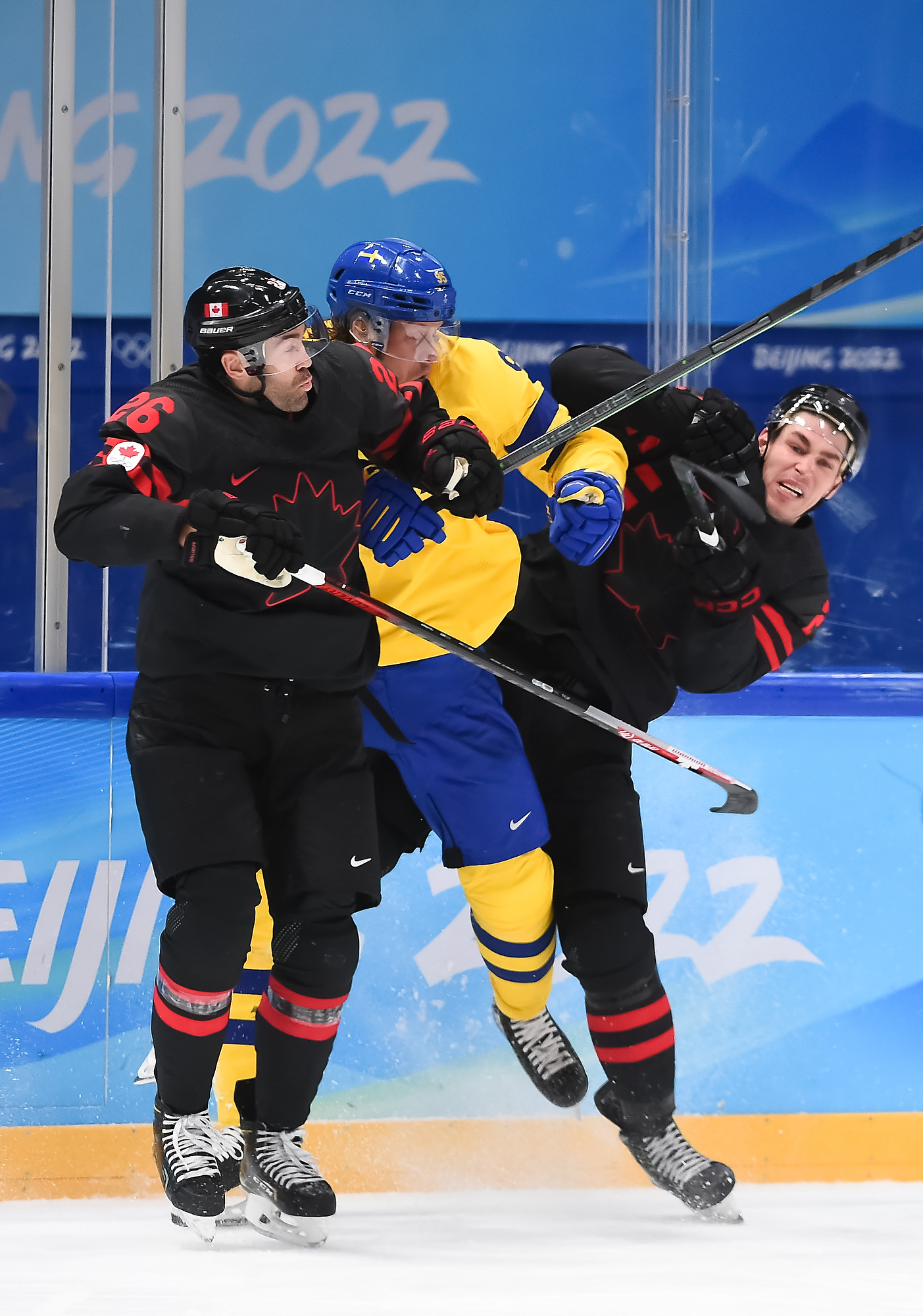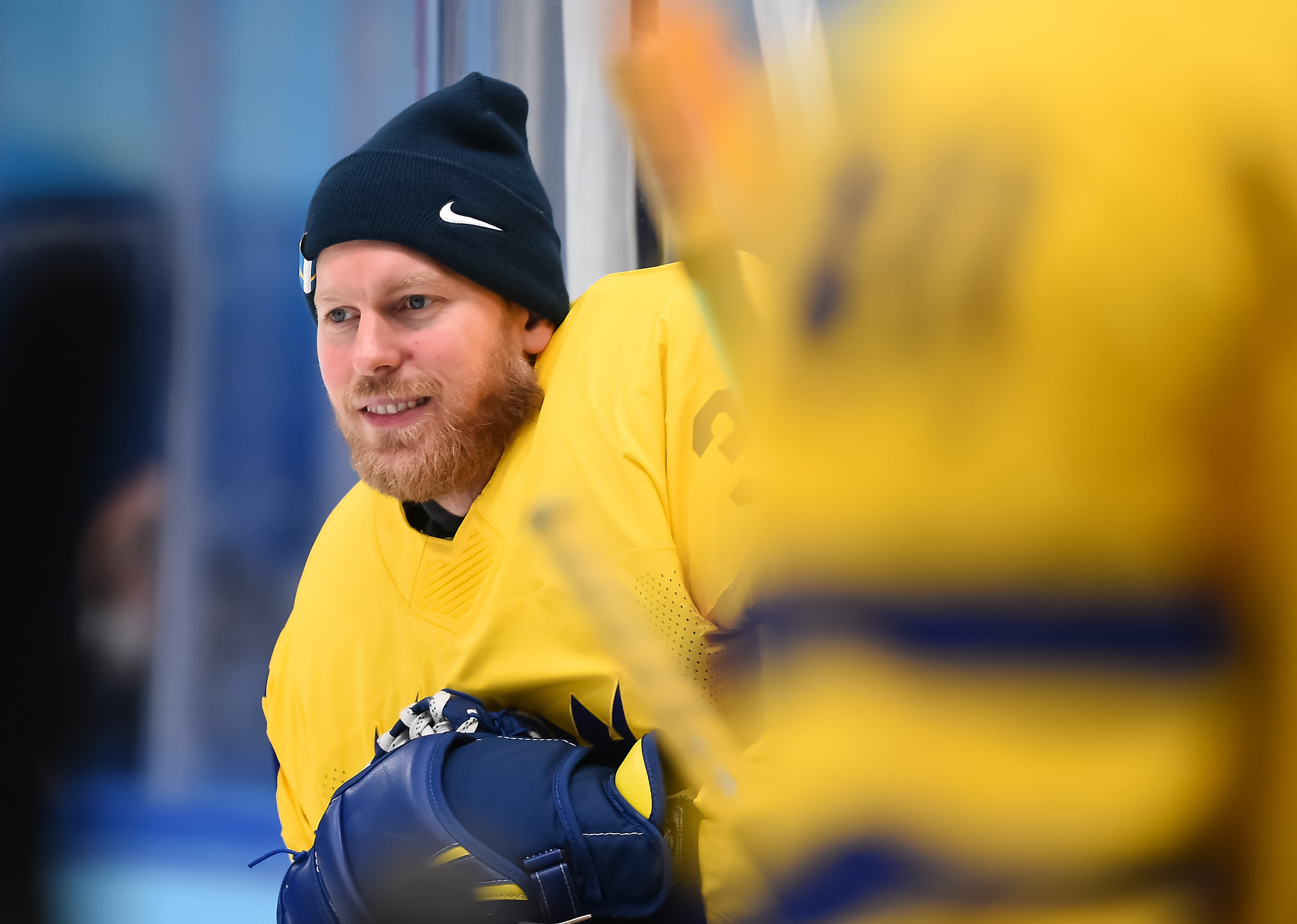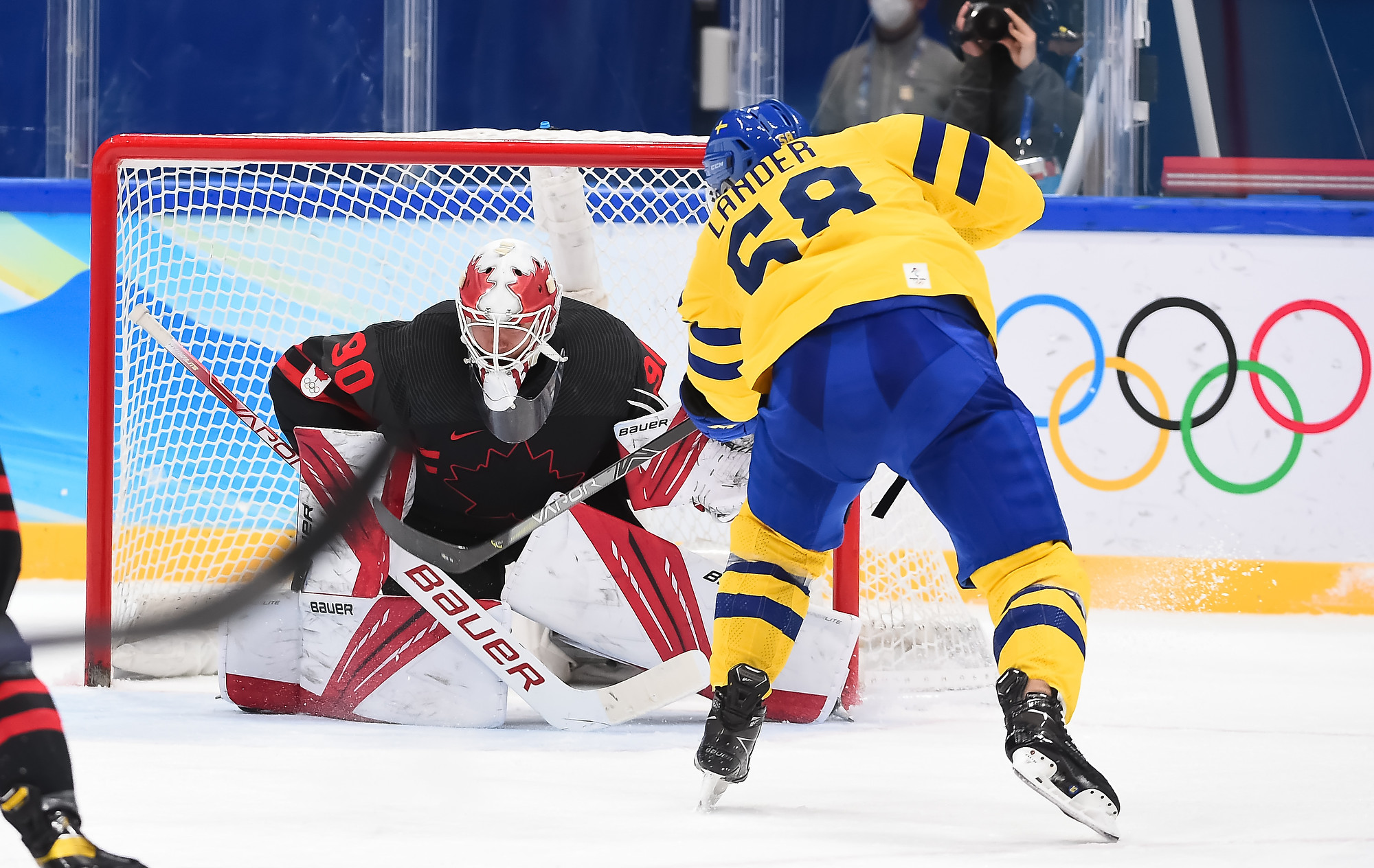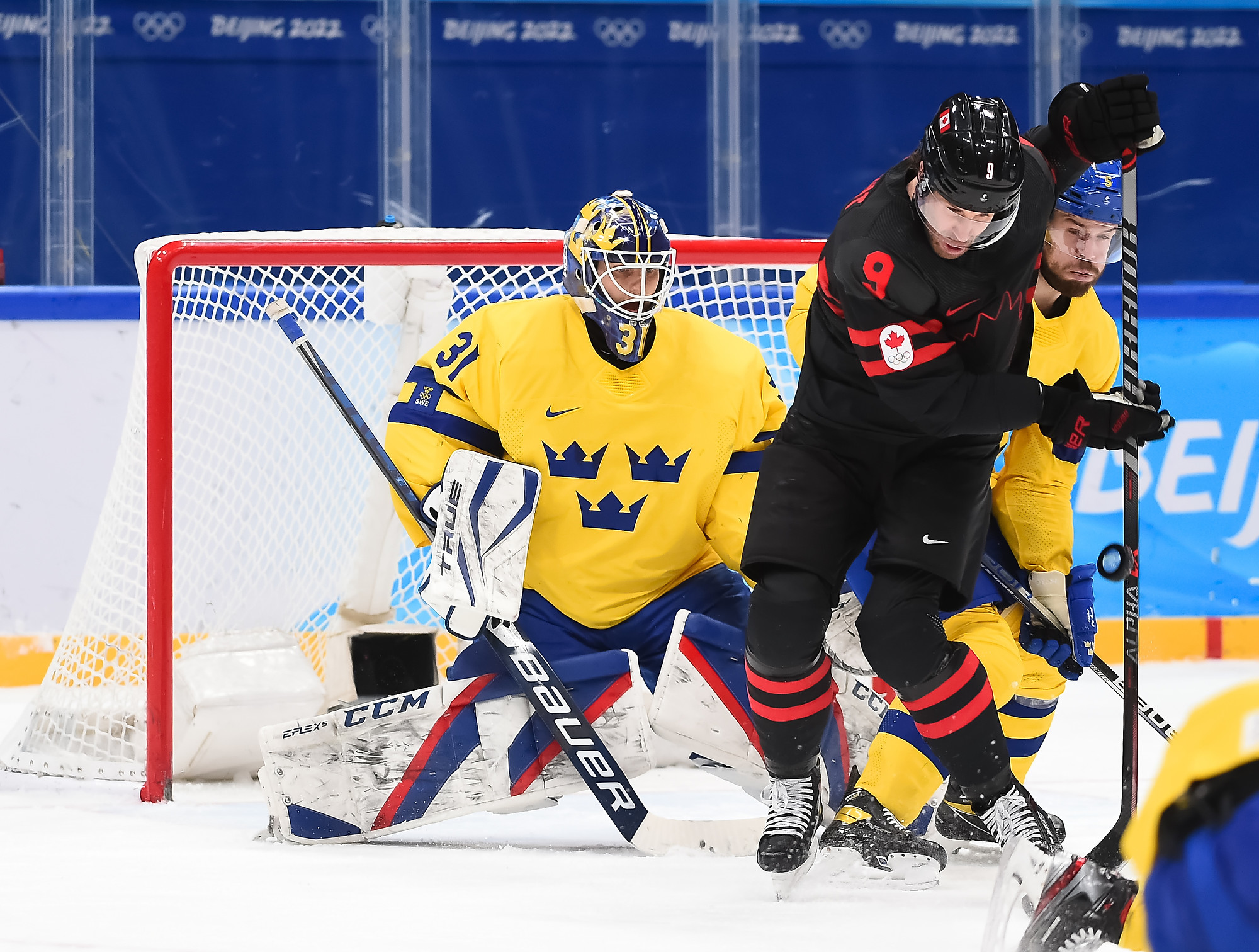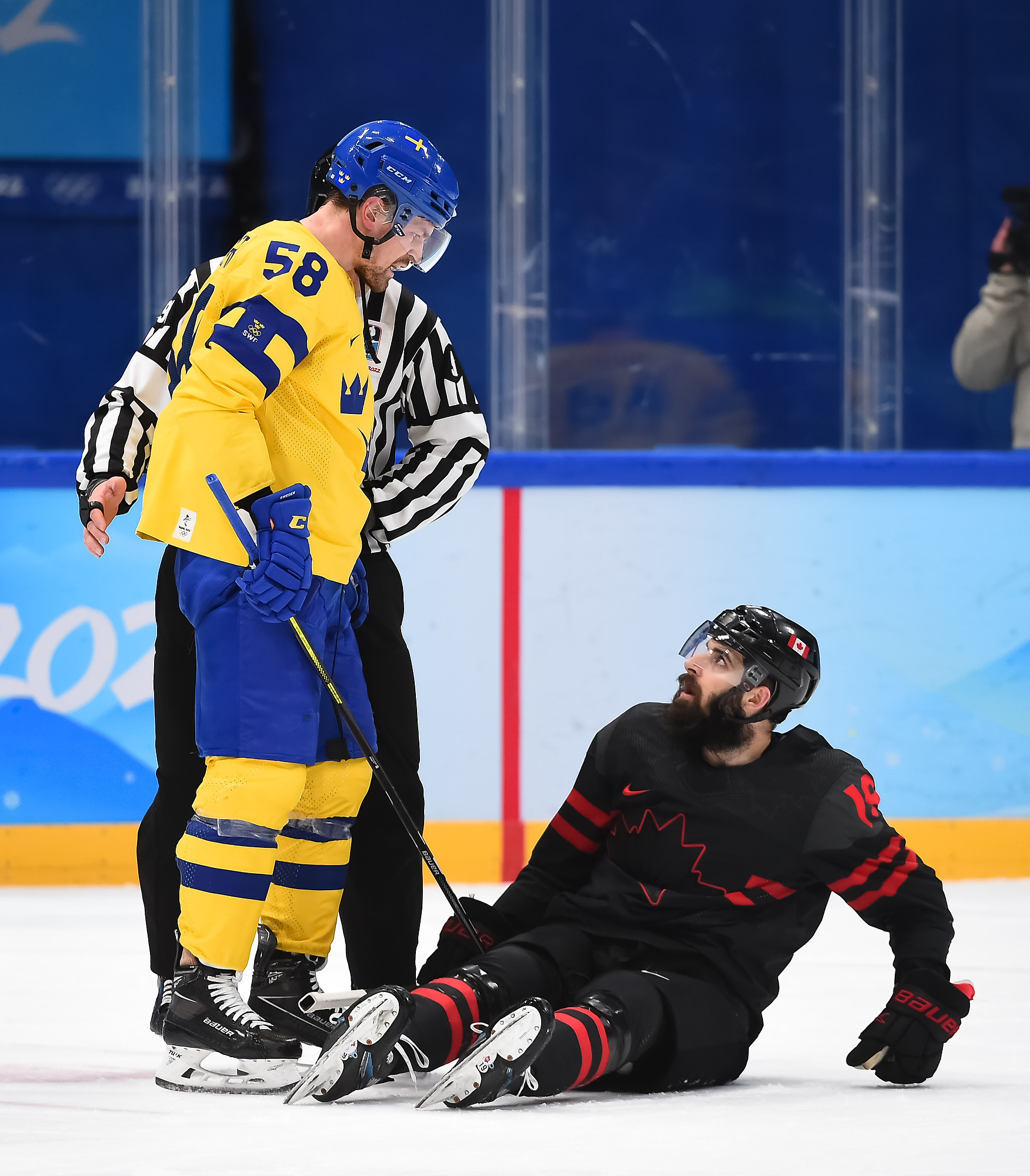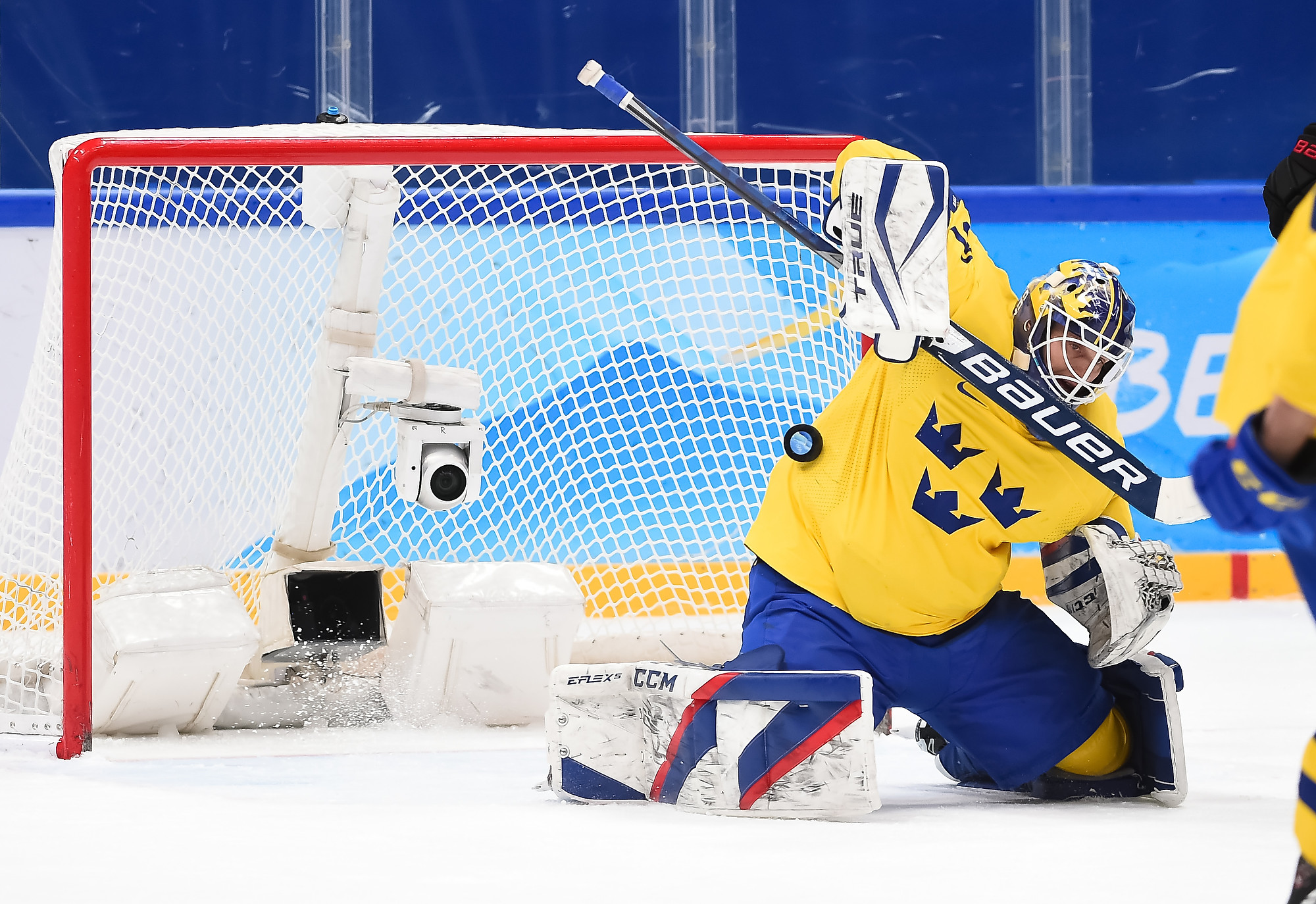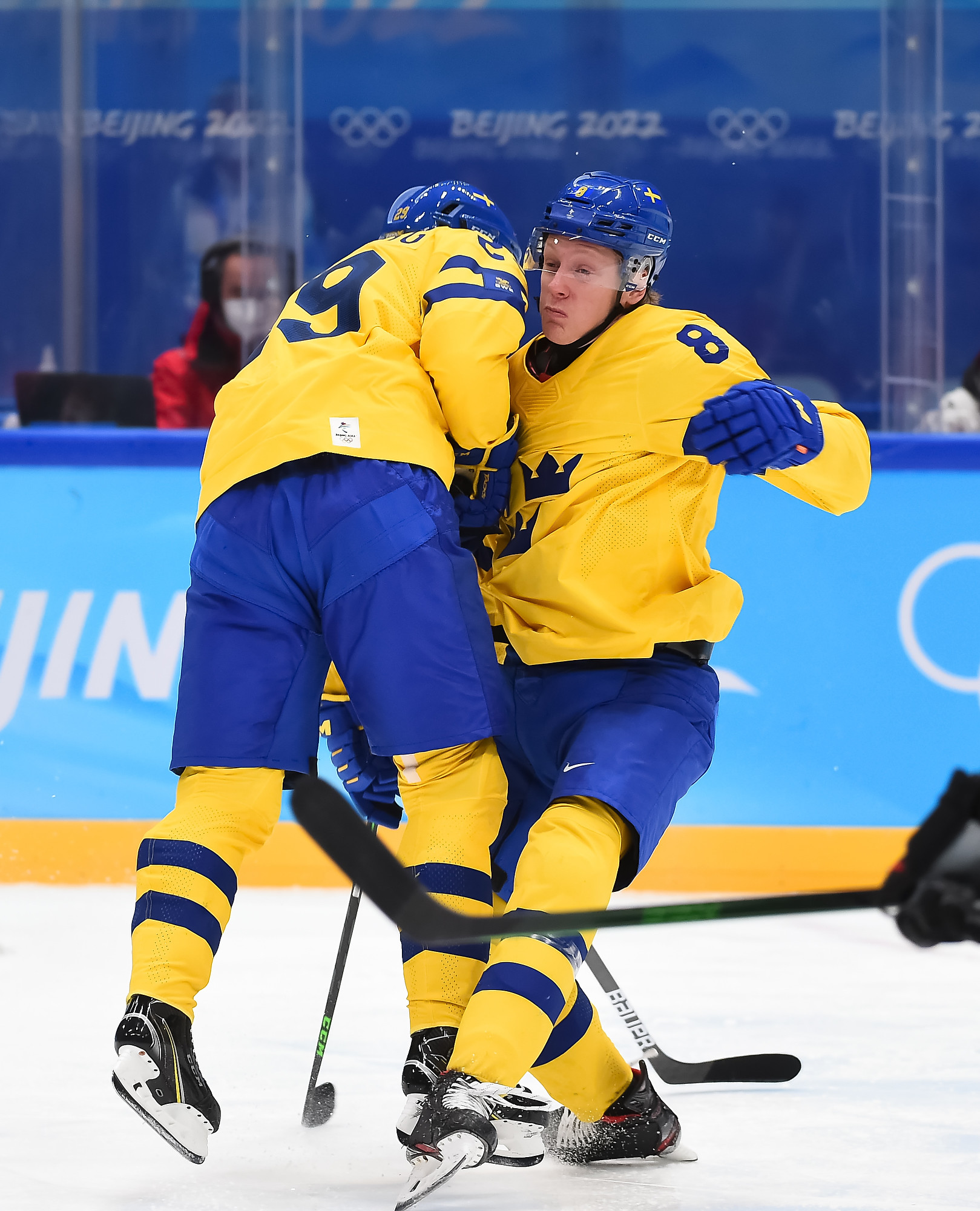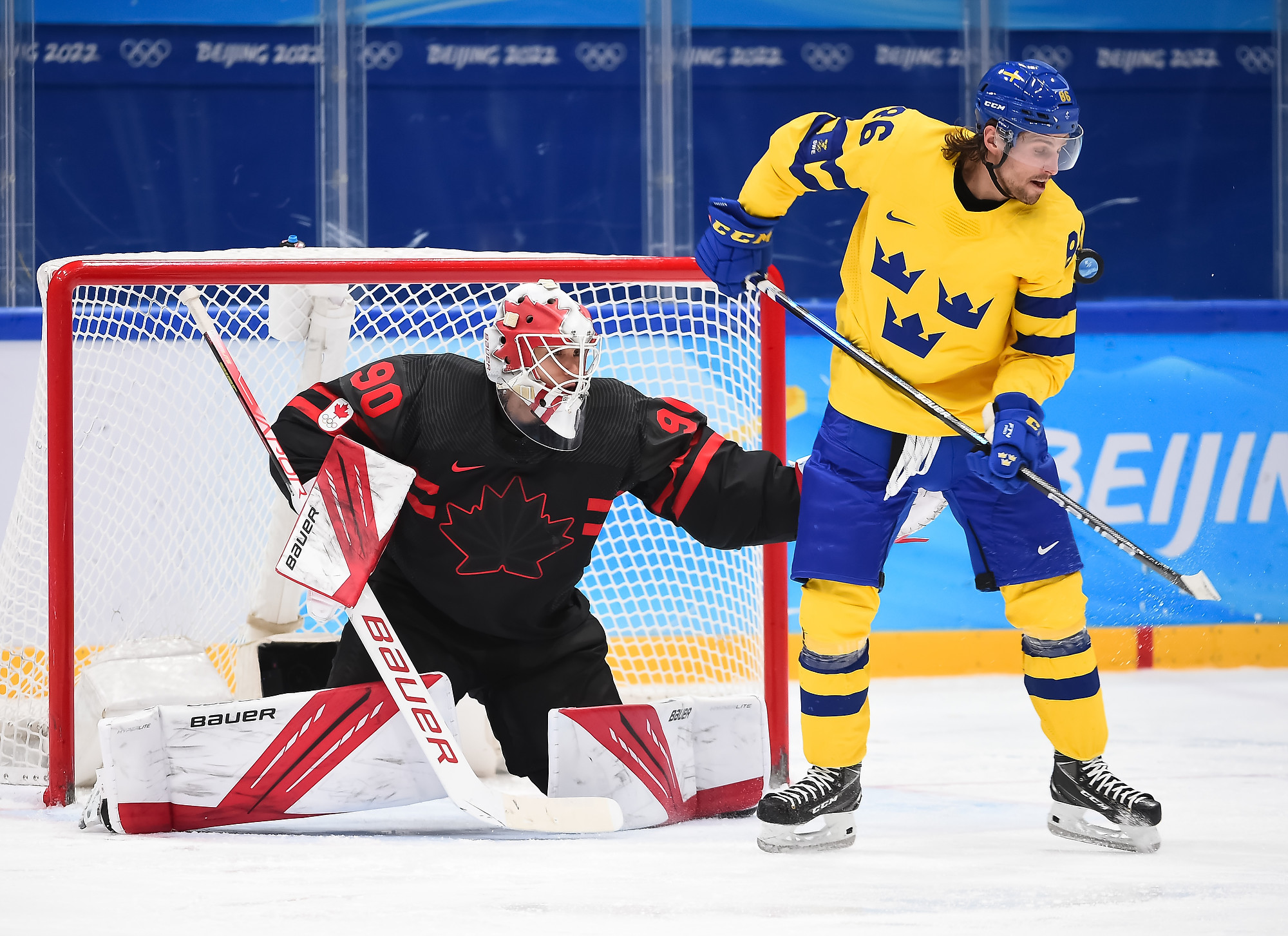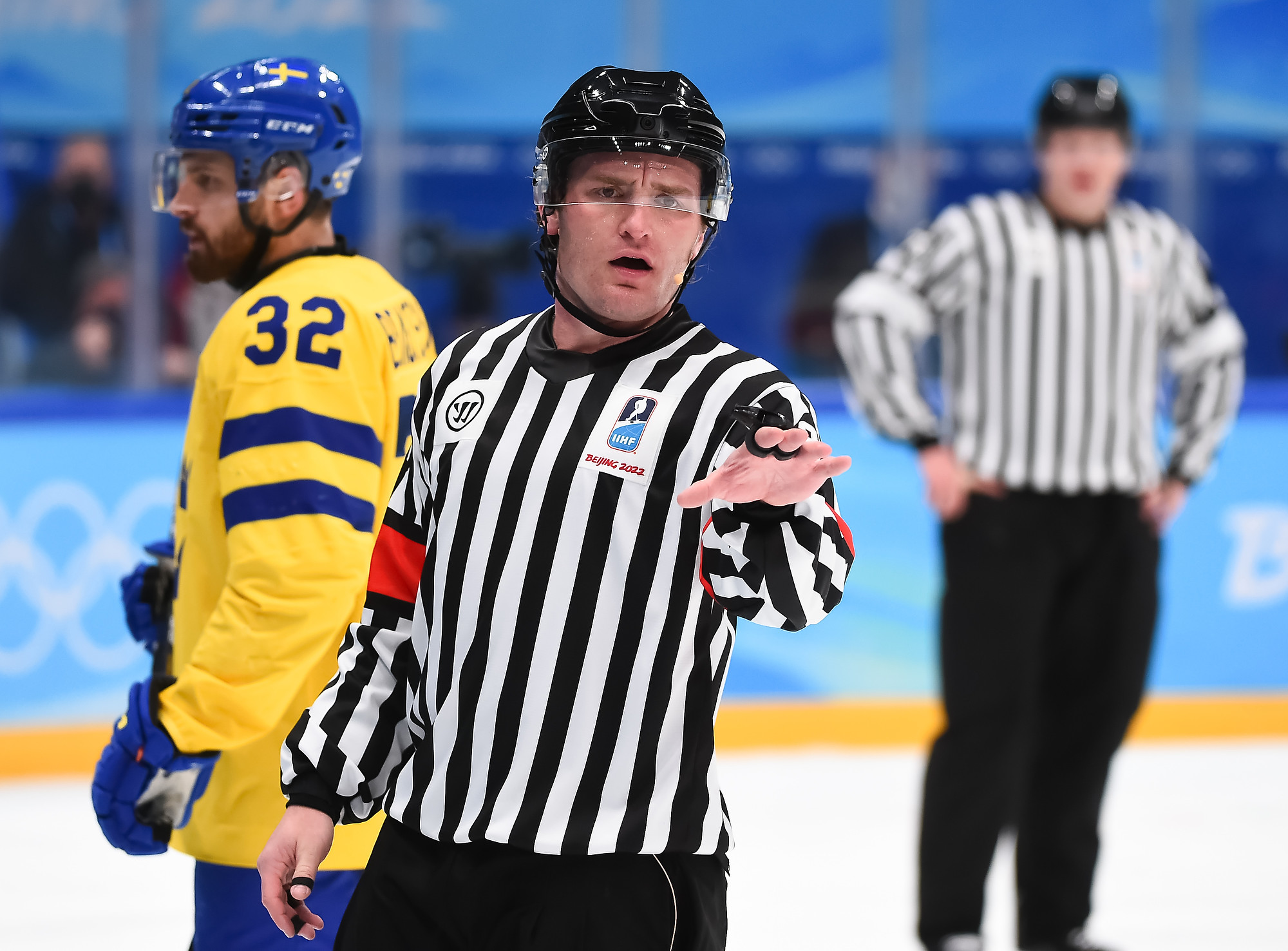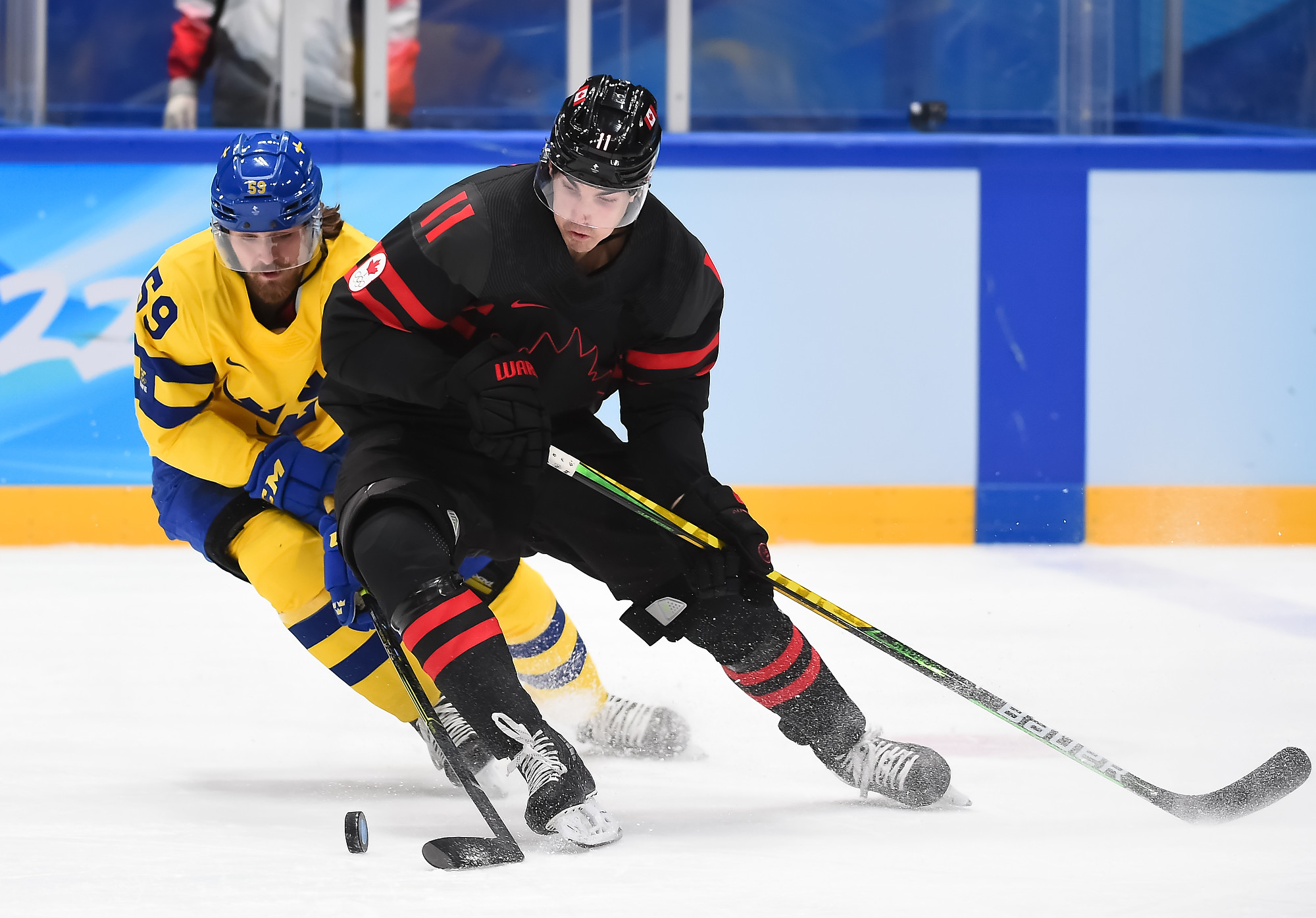Sweden's Christian Folin #2 collides with Canada's Tyler Wotherspoon #23 and Josh Ho-Sang #96.
photo: Matt Zambonin / HHOF-IIHF Images
Not every clash of the titans delivers an epic. This much-anticipated Olympic quarter-final battle between Sweden and Canada was more of an arm wrestle than an exhibition. Not that the Swedes will care after a 2-0 verdict booked a place in the medal round at the 2022 Olympic men’s tournament. That represents a return to form for the Tre Kronor, who bowed out in the 2018 QF against Germany.
It took more than 50 minutes of often grinding hockey to break the deadlock at the National Indoor Stadium. And when Lucas Wallmark did put Sweden in front, it was in keeping with the preceding action that the goal stemmed from a defensive error.
Canada got caught out trying to clear its zone, with Jack McBain’s blind pass going badly astray. Wallmark stole the puck and evaded the attentions of Tyler Wotherspoon as the defenceman tried to retrieve the situation. But Sweden’s CSKA Moscow forward was not to be denied, firing inside Matt Tomkins’ post with the help of a deflection. That strike moves Wallmark to five goals, tied with Slovakia’s Juraj Slafkovsky, as the leading sniper at the Games. More importantly, it steered Sweden past Canada into a semi-final match-up with team ROC.
"I don't know if it's the biggest goal I've ever scored," said Wallmark. "It's up there, but hopefully I can score some bigger ones in future.
"I saw him do the little back pass there and I had a step on them and got it, and then I was lucky that it went in. I think it hit the D-man’s stick, but I’ll take that any day."
Canadian head coach Claude Julien reflected on the moment that decided the game: "We knew it was going to be one of those games where whoever got a bit of a break would win and that’s what happened. It was a mistake on our part. At the same time, it was a break on their part as it hit a stick and went in, and unfortunately that’s hockey."
The cagey play that typified this encounter was perhaps not a surprise. These teams know each other very well. Two of the Canadian players, leading scorer Adam Tambellini and goalie Matt Tomkins, currently play in the Swedish League at Rogle and Frolunda respectively. Many more are in regular contact in other European leagues. That familiarity undoubted contributed to the tight battle that unfolded.
"It was two great teams battling hard," said Swedish captain Anton Lander. "It was a game we didn’t give up much, back and forth with solid defence and hard work, and I think patience was the word of this game."
Canadian goalie Matt Tomkins saw it as a game of few chances.
"It came down to once bounce, really. A lucky bounce," he said. "Not much more to say than that. It was a tight game and it sucks to be on the losing end of it.
"There weren’t a lot of chances either way, but we knew going into the third, it was going to come down to an ugly one. If he shoots the puck and it doesn’t deflect, it’s not going in."
Historically, too, these teams often deliver tight games. Their last encounter, in the 2017 World Championship, had little to choose between them. On that occasion, the Tre Kronor won it in a shoot-out after a 1-1 tie; the two goals were separated by barely two minutes of game time either side of the second intermission. Nicklas Backstrom settled that one in the extras to wrest the title away from Canada.
The teams’ most recent Olympic meeting was also a gold-medal game: in 2014, Canada beat Sweden 3-0 in Sochi on goals from Jonathan Toews, Sid Crosby and Chris Kunitz.
However, there was little golden about a stodgy first period. Sweden had slightly more shots on goal, but there was little to trouble Tomkins or his opposite number Lars Johansson. Canada’s best opportunity came midway through the opening stanza when McBain whipped the puck into the danger zone by Eric Staal was unable to force it home.
At the other end, Sweden’s best chance came on a Canadian power play. A breakaway presented Jacob de la Rose with a chance, but he failed to extend Tomkins.
"They were fresh and they came out with a lot of jump," added coach Julien. "It took us a while to get our game going. They did a great job of keeping us on the outside – we were hard-pressed to get on the inside."
Swedish goalie Johansson paid tribute to his colleague's work rate as they protected his net. "It’s a great win and a great performance by the team tonight," he said. "We played a solid 60 minutes and barely gave up any chances, and after we got that 1-0 goal, I think we controlled the game and didn’t give them anything."
"They had a couple of chances on the power play but other than that, they didn’t really get into the net like Canada is famous for – getting in front, screening, getting tips. I think we kept them on the outside and I could see the pucks. We have a solid defence, we know that, but it’s really important that they stepped up here in the quarter-finals."
That solid defence continued to dominate in the second period. In the first 10 minutes of the frame, the teams shared just five shots on goal between them and the most anxious moment came when Mathias Brome batted down a bouncing puck and caused Tomkins momentary discomfort before the Canadian goalie got on top of it.
Brome was involved again to carve out the clearest chance of the game when his pass picked out Anton Lander in space at the far post. The Swedish captain, currently playing for EV Zug in Switzerland, got a shot off but was denied by Tomkins’ blocker.
At the other end, Canada had the puck in the net late in the second stanza. However, Jason Demers’ point shot came after a whistle for interference by Jordan Weal as the Ak Bars Kazan forward wrestled Lukas Bengtsson’s stick out of his hands while jockeying for position on the slot.
Despite the limited opportunities, Lander said that Sweden never doubted it could win. "We believed and we thought we had more energy," he said. "We just needed to keep coming in waves, keep working hard and sooner or later, the puck’s going to bounce in."
The third period brought few further chances: it took Canada almost 10 minutes of the frame to muster a shot on target. Even after the Swedes got in front, the Canadians struggled to test Johansson. The SKA St. Petersburg goalie was well protected by his defence, with Sweden enjoying the better of life on the face-off spot and making it hard for Canada to get players to the net for long periods.
And when Tomkins was called to the bench, a breakdown saw Lander put a second goal into the empty net to seal Sweden's progress. Johansson finished with 24 saves to claim the shut-out, his first at these Games.
Wednesday's loss means the end of Eric Staal's Olympic adventure. It came a couple of days earlier than the Triple Gold member would have wanted, but he was still grateful for one last trip to the tournament.
"It’s still a great experience, being here and getting to know these guys," he said. "It felt like we gelled together quickly and we really like being around each other. That makes it sting even more at this point. It was tough to end this way, but I’m really happy with how we competed."
Sweden, though, moves on to a semi-final against Team ROC - and for lovers of historical omens, the signs are good for the Scandinavians. In 1994 and 2006, on its journey to Olympic gold, Sweden defeated Russia along the way.
It took more than 50 minutes of often grinding hockey to break the deadlock at the National Indoor Stadium. And when Lucas Wallmark did put Sweden in front, it was in keeping with the preceding action that the goal stemmed from a defensive error.
Canada got caught out trying to clear its zone, with Jack McBain’s blind pass going badly astray. Wallmark stole the puck and evaded the attentions of Tyler Wotherspoon as the defenceman tried to retrieve the situation. But Sweden’s CSKA Moscow forward was not to be denied, firing inside Matt Tomkins’ post with the help of a deflection. That strike moves Wallmark to five goals, tied with Slovakia’s Juraj Slafkovsky, as the leading sniper at the Games. More importantly, it steered Sweden past Canada into a semi-final match-up with team ROC.
"I don't know if it's the biggest goal I've ever scored," said Wallmark. "It's up there, but hopefully I can score some bigger ones in future.
"I saw him do the little back pass there and I had a step on them and got it, and then I was lucky that it went in. I think it hit the D-man’s stick, but I’ll take that any day."
Canadian head coach Claude Julien reflected on the moment that decided the game: "We knew it was going to be one of those games where whoever got a bit of a break would win and that’s what happened. It was a mistake on our part. At the same time, it was a break on their part as it hit a stick and went in, and unfortunately that’s hockey."
The cagey play that typified this encounter was perhaps not a surprise. These teams know each other very well. Two of the Canadian players, leading scorer Adam Tambellini and goalie Matt Tomkins, currently play in the Swedish League at Rogle and Frolunda respectively. Many more are in regular contact in other European leagues. That familiarity undoubted contributed to the tight battle that unfolded.
"It was two great teams battling hard," said Swedish captain Anton Lander. "It was a game we didn’t give up much, back and forth with solid defence and hard work, and I think patience was the word of this game."
Canadian goalie Matt Tomkins saw it as a game of few chances.
"It came down to once bounce, really. A lucky bounce," he said. "Not much more to say than that. It was a tight game and it sucks to be on the losing end of it.
"There weren’t a lot of chances either way, but we knew going into the third, it was going to come down to an ugly one. If he shoots the puck and it doesn’t deflect, it’s not going in."
Historically, too, these teams often deliver tight games. Their last encounter, in the 2017 World Championship, had little to choose between them. On that occasion, the Tre Kronor won it in a shoot-out after a 1-1 tie; the two goals were separated by barely two minutes of game time either side of the second intermission. Nicklas Backstrom settled that one in the extras to wrest the title away from Canada.
The teams’ most recent Olympic meeting was also a gold-medal game: in 2014, Canada beat Sweden 3-0 in Sochi on goals from Jonathan Toews, Sid Crosby and Chris Kunitz.
However, there was little golden about a stodgy first period. Sweden had slightly more shots on goal, but there was little to trouble Tomkins or his opposite number Lars Johansson. Canada’s best opportunity came midway through the opening stanza when McBain whipped the puck into the danger zone by Eric Staal was unable to force it home.
At the other end, Sweden’s best chance came on a Canadian power play. A breakaway presented Jacob de la Rose with a chance, but he failed to extend Tomkins.
"They were fresh and they came out with a lot of jump," added coach Julien. "It took us a while to get our game going. They did a great job of keeping us on the outside – we were hard-pressed to get on the inside."
Swedish goalie Johansson paid tribute to his colleague's work rate as they protected his net. "It’s a great win and a great performance by the team tonight," he said. "We played a solid 60 minutes and barely gave up any chances, and after we got that 1-0 goal, I think we controlled the game and didn’t give them anything."
"They had a couple of chances on the power play but other than that, they didn’t really get into the net like Canada is famous for – getting in front, screening, getting tips. I think we kept them on the outside and I could see the pucks. We have a solid defence, we know that, but it’s really important that they stepped up here in the quarter-finals."
That solid defence continued to dominate in the second period. In the first 10 minutes of the frame, the teams shared just five shots on goal between them and the most anxious moment came when Mathias Brome batted down a bouncing puck and caused Tomkins momentary discomfort before the Canadian goalie got on top of it.
Brome was involved again to carve out the clearest chance of the game when his pass picked out Anton Lander in space at the far post. The Swedish captain, currently playing for EV Zug in Switzerland, got a shot off but was denied by Tomkins’ blocker.
At the other end, Canada had the puck in the net late in the second stanza. However, Jason Demers’ point shot came after a whistle for interference by Jordan Weal as the Ak Bars Kazan forward wrestled Lukas Bengtsson’s stick out of his hands while jockeying for position on the slot.
Despite the limited opportunities, Lander said that Sweden never doubted it could win. "We believed and we thought we had more energy," he said. "We just needed to keep coming in waves, keep working hard and sooner or later, the puck’s going to bounce in."
The third period brought few further chances: it took Canada almost 10 minutes of the frame to muster a shot on target. Even after the Swedes got in front, the Canadians struggled to test Johansson. The SKA St. Petersburg goalie was well protected by his defence, with Sweden enjoying the better of life on the face-off spot and making it hard for Canada to get players to the net for long periods.
And when Tomkins was called to the bench, a breakdown saw Lander put a second goal into the empty net to seal Sweden's progress. Johansson finished with 24 saves to claim the shut-out, his first at these Games.
Wednesday's loss means the end of Eric Staal's Olympic adventure. It came a couple of days earlier than the Triple Gold member would have wanted, but he was still grateful for one last trip to the tournament.
"It’s still a great experience, being here and getting to know these guys," he said. "It felt like we gelled together quickly and we really like being around each other. That makes it sting even more at this point. It was tough to end this way, but I’m really happy with how we competed."
Sweden, though, moves on to a semi-final against Team ROC - and for lovers of historical omens, the signs are good for the Scandinavians. In 1994 and 2006, on its journey to Olympic gold, Sweden defeated Russia along the way.
Sweden vs Canada (QF) - 2022 Olympic Men's Ice Hockey Tournament
OF


